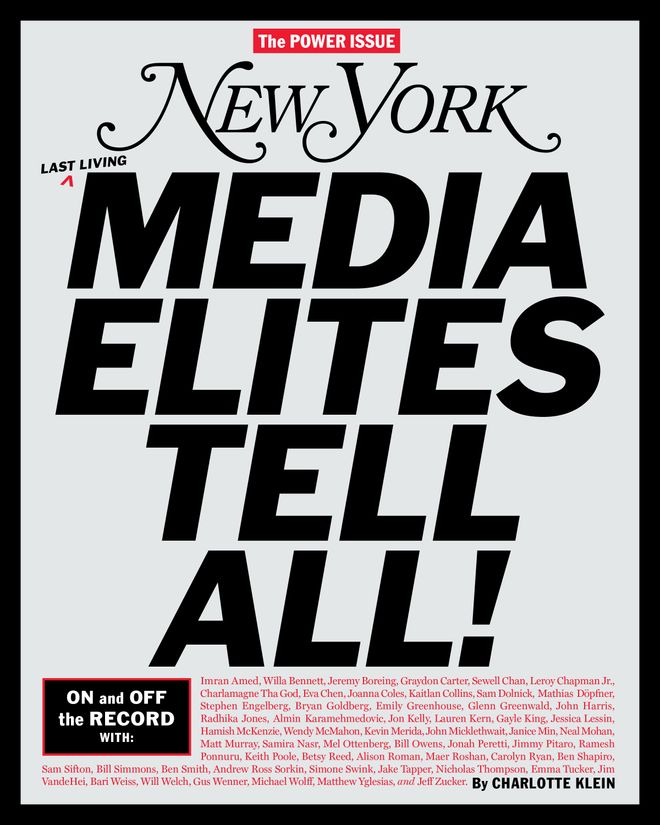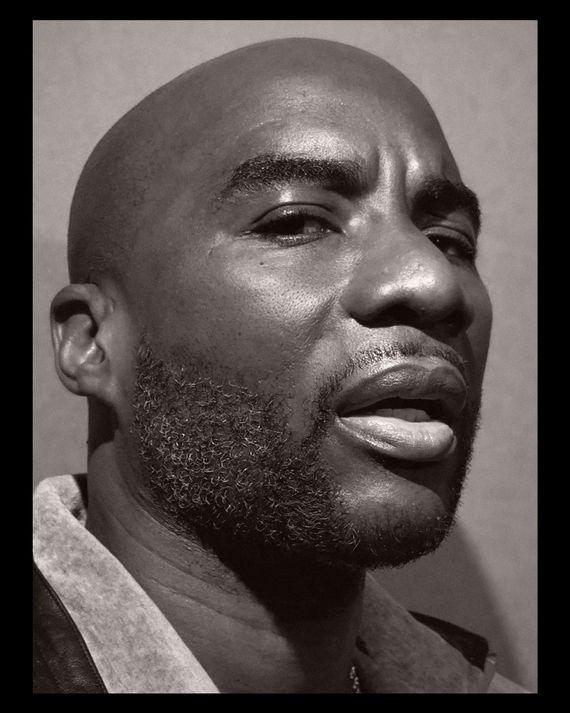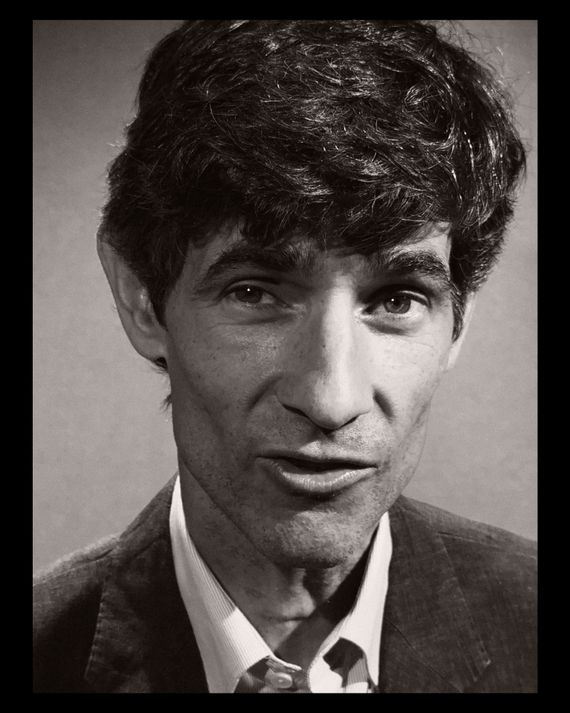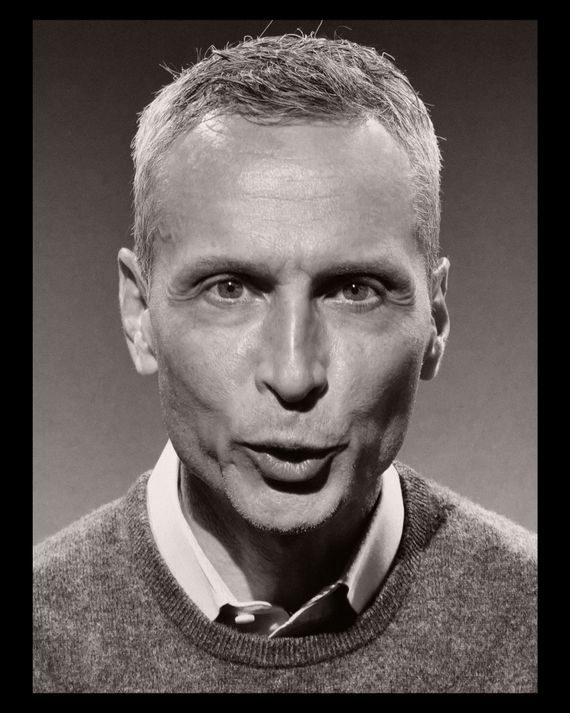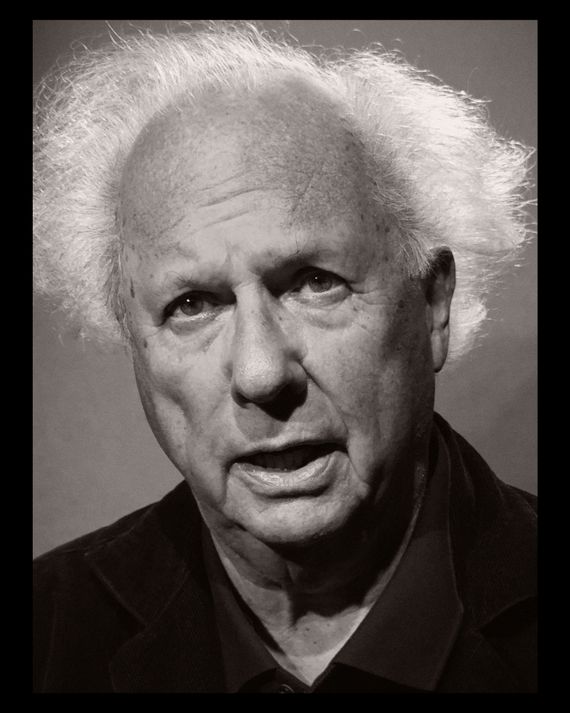
Imran Amed, founder and editor-in-chief, The Enterprise of Vogue. | Willa Bennett, editor-in-chief, Cosmopolitan and Seventeen. | Jeremy Boreing, co-founder and co-CEO, The Every day Wire. | Graydon Carter, founder and co-editor, Air Mail. | Sewell Chan, govt editor, Columbia Journalism Overview. | Leroy Chapman Jr., editor-in-chief, the Atlanta Journal-Structure. | Charlamagne tha God, co-host, The Breakfast Membership. | Eva Chen, vice-president of style, Meta. | Joanna Coles, chief inventive and content material officer, The Every day Beast. | Kaitlan Collins, anchor, CNN’s The Supply. | Sam Dolnick, deputy managing editor, the New York Occasions. | Mathias Döpfner, CEO, Axel Springer SE. | Stephen Engelberg, editor-in-chief, ProPublica. | Bryan Goldberg, CEO, Bustle Digital Group. | Emily Greenhouse, editor, The New York Overview of Books. | Glenn Greenwald, host, System Replace; co-founder, The Intercept. | John Harris, co-founder and international editor-in-chief, Politico. | Radhika Jones, editor-in-chief, Vainness Truthful. | Almin Karamehmedovic, president, ABC Information. | Jon Kelly, co-founder and editor-in-chief, Puck. | Lauren Kern, editor-in-chief, Apple Information. | Gayle King, co-host, CBS Mornings. | Jessica Lessin, founder and editor-in-chief, The Info. | Hamish McKenzie, co-founder, Substack. | Wendy McMahon, president and CEO, CBS Information and Stations and CBS Media Ventures. | Kevin Merida, former govt editor, the Los Angeles Occasions. | John Micklethwait, editor-in-chief, Bloomberg. | Janice Min, founder and CEO, Ankler Media. | Neal Mohan, CEO, YouTube. | Matt Murray, govt editor, the Washington Publish. | Samira Nasr, editor-in-chief, Harper’s Bazaar. | Mel Ottenberg, editor-in-chief, Interview. | Invoice Owens, govt producer, CBS’s 60 Minutes. | Jonah Peretti, co-founder and CEO, BuzzFeed, Inc. | Jimmy Pitaro, chairman, ESPN. | Ramesh Ponnuru, editor, Nationwide Overview. | Keith Poole, editor-in-chief, the New York Publish Group. | Betsy Reed, editor, The Guardian US | Alison Roman, author and chef. | Maer Roshan, co-editor-in-chief, The Hollywood Reporter. | Carolyn Ryan, managing editor, the New York Occasions. | Ben Shapiro, host, The Ben Shapiro Present; co-founder, The Every day Wire. | Sam Sifton, assistant managing editor, the New York Occasions; founding editor, New York Occasions Cooking. | Invoice Simmons, founder and managing director, The Ringer; head of podcast innovation and monetization, Spotify. | Ben Smith, co-founder and editor-in-chief, Semafor. | Andrew Ross Sorkin, founder and editor-at-large, the New York Occasions’ DealBook; co-anchor, CNBC’s Squawk Field. | Simone Swink, senior govt producer, ABC’s Good Morning America. | Jake Tapper, anchor and chief Washington correspondent, CNN. | Nicholas Thompson, CEO, The Atlantic. | Emma Tucker, editor-in-chief, The Wall Road Journal. | Jim VandeHei, co-founder and CEO, Axios; co-founder, Politico. | Bari Weiss, founder and editor, The Free Press. | Will Welch, international editorial director, GQ and Pitchfork. | Gus Wenner, CEO, Rolling Stone. | Michael Wolff, writer. | Matthew Yglesias, author, Gradual Boring; co-founder, Vox.com. | Jeff Zucker, CEO, RedBird IMI.
When this journal revived the annual “Energy Challenge” final 12 months, we assembled a listing of secretly highly effective New Yorkers in an effort to elucidate how town truly works. This 12 months, we have been curious to grasp how the information media is surviving in a time of imploding enterprise fashions and report public mistrust. We gathered 57 of probably the most highly effective individuals in media — and reasonably than merely anoint them, we put them to work. What follows is a tour via the state of journalism, assembled from dozens of hours of extraordinarily candid conversations.
Some executives we spoke to are within the enterprise of preserving legacy establishments just like the New York Occasions or the Washington Publish viable; some try to construct new media firms like Puck, The Ankler, or The Free Press; some are sole proprietors of their very own manufacturers through newsletters or audio. We centered largely on the information media: the organizations and people chargeable for producing and distributing info to the general public, whether or not it considerations politics or style or sports activities. And since information organizations are clearly now not the one locations — or, in some circumstances, even the principle locations — individuals get their information at present, we didn’t look simply at conventional information retailers. We additionally included individuals like Neal Mohan, head of YouTube, the platform the place zoomers are more and more prone to get their information, and Lauren Kern, head of Apple Information, primarily the world’s largest newsstand.
All of those media insiders have watched up shut because the enterprise that undergirds journalism modified dramatically previously decade, and nearly all of them would agree that it hasn’t, for probably the most half, been for the higher. We wished to grasp not simply what this new state of media seems like however what the way forward for getting dependable information out on the earth may truly be. Which information organizations are struggling most to seek out their footing, and which appear to have found out methods to discover an viewers? Can any of these firms get individuals to pay for his or her journalism? What’s the purpose of print? Are Fb, Google, and X the enemies of the press or nonetheless, in some way, its salvation? What occurred to the {industry} that scaled as much as manufacture clickbait? And who’s going to coach the following technology of journalists? Is getting 9,000 regular paying readers higher than making an attempt to achieve a mass viewers? And might anybody apart from TikTok and Fb even attain a mass viewers lately?
Some unquestionably highly effective figures declined to take part, and to keep away from the plain conflicts, we didn’t embrace any present staff from, or any conversations about, New York or its mum or dad firm, Vox Media. We additionally allowed those that spoke to us to be nameless as typically as they wished since our driving curiosity was in having genuinely trustworthy conversations with individuals vital sufficient that they will’t at all times be candid when quoted by title.
One query that emerged was whether or not any group or particular person has the power to affect tradition or form views as was as soon as widespread on this enterprise; that position at present appears to relaxation extra with social platforms and search engines like google, in addition to the singular determine of Elon Musk. Our sources struggled to determine how energy within the media works now. It’s not that nobody has energy anymore, however their attain is more and more slender and threatened by the quickly eroding settlement over the info.
Nonetheless, we discovered numerous optimism in regards to the media enterprise and its future. Even those that are gloomy in regards to the state of the {industry} see numerous good work being performed in their very own retailers and people of their rivals. As one editor-in-chief impishly put it, “Everybody who’s not having enjoyable and simply doing Twentieth-century stuff is so boring. It’s an excessive amount of work to not have enjoyable in it. The media universe will maintain remodeling, and a few adjustments will likely be for the higher. 5 years from now, we’ll all be completely different as a result of it seems like we’re on the cusp of some loopy new factor.”
The Promoting Enterprise | AI | Air Mail | Apple Information | Axios | Jeff Bezos | The Bosses | A Temporary Historical past | CNN.com | Condé Nast | Covers | Entry-Degree Journalists | Fb | Google | Native Information | The Los Angeles Occasions | Media Gossip | Media Moguls | Rupert Murdoch | Elon Musk | Newsletters | The New York Occasions | Print | Puck | Punchbowl Information | The Scoop Enterprise | Semafor | Subscriptions | Substack | TV Information | The Wall Road Journal | The Washington Publish | Who Controls the Media? | YouTube
“Collapsing as at all times, I’m reliably instructed.” — Ben Smith • “Going to hell in a handbasket. There could also be, down the highway, a manner out of it, however I simply don’t know what it’s.” — Graydon Carter • “Like the hearth swamp in The Princess Bride. It’s treacherous in locations, you may go up in flames, you may be attacked by a rodent of bizarre dimension, however you could be a little little bit of a pirate and anticipate these threats and determine methods to defuse them.” — Radhika Jones • “It’s in flux, and the small and powerful will survive.” — Janice Min • “I don’t really feel like staff perceive how precarious it’s in any respect.” — Carolyn Ryan • “Going to look very completely different over the following 5 years than it did for the earlier 50.” — Jeff Zucker • “I believe you’d must be loopy to start a profession in journalism proper now.” — A media govt who knew higher than to say it on the report
“We misplaced our enterprise mannequin due to the web, which everyone is aware of, however not for the explanations they assume. It was merely that the tech firms constructed a greater promoting mannequin and we weren’t in a position to reply rapidly sufficient. The newspapers misplaced their labeled advertisements, the native newspapers misplaced their monopoly on distribution for sure areas, and the magazines misplaced their monopoly on distribution amongst completely different curiosity teams. For those who wished to, 20 years in the past, promote golf balls, to procure an advert in Golf journal; now, you purchase a Fb advert focused to individuals who have re-upped their golf-club memberships. So there simply was a greater manner of promoting. And we didn’t see that at first of this tech revolution. We have been so enthusiastic about infinite free distribution we didn’t see that the entire premise of the enterprise mannequin that supported this factor was getting undercut comparatively rapidly. We didn’t reply appropriately and didn’t construct the proper enterprise fashions rapidly sufficient. Then by the point we did, most of us had our lunch eaten. What’s one predominant manner The Atlantic and different critical publications drive subscriptions? They purchase advertisements on Fb.” — Nicholas Thompson, CEO, The Atlantic
“One brand-new factor within the teenagers was this fantasy that you may turn into tech-rich off journalism. Sure locations started enjoying a scale recreation, pondering they may get a toehold towards Google and Fb. In fact, to develop as quick as they thought they would wish to, they determined they needed to take enterprise cash — that felt like, We need to be a tech firm, and we’re going to do what tech individuals do. It had shades of WeWork, making an attempt to inform a narrative about your self that buyers might get behind whereas elevating cash, when actually you’re doing what everybody else is, which is fairly simple: making content material and making an attempt to promote sponsorship towards it. Then everybody bought underwater. I liken it to everybody who bought a straightforward mortgage on a house in 2007 not understanding they have been already in default.” — Janice Min, founder and CEO, Ankler Media
“No one needs to be ready the place their firm is overwhelmingly reliant on any trillion-dollar entity for distribution or monetization, proper? That’s only a very weak place to place your online business in. There are many latest examples of firms that discovered the exhausting manner.” — Jon Kelly, editor-in-chief, Puck
“I used to be very hopeful that the large tech platforms would see us as very complementary. There was a tremendous ten-year run of a symbiotic relationship after which the social platforms bought highly effective and strangled numerous the businesses that have been probably the most centered on making content material for them. It was painful for us. We’re lastly on the opposite facet of this shift and constructing our enterprise on direct site visitors. Nevertheless it was a dying sentence for among the publishers that have been actually centered on getting their viewers from Fb.” — Jonah Peretti, CEO, BuzzFeed
“Google actually undermined skilled journalism once they moved away from PageRank. It’s one factor to put much less emphasis or weight on authority. It’s one other to actively hurt these publishing homes which have reputations and authority. And I believe that they spent the previous ten years seeing how far they will push their monopoly and what they will get away with. What they discovered is they will get away with a fantastic deal.” — Bryan Goldberg, CEO, Bustle Digital Group
It’s fairly easy, explains Bloomberg editor-in-chief John Micklethwait: “You produce good content material; you get individuals to pay for it; the cash you get from these individuals paying for it, you produce extra good content material. For those who don’t have a system whereby you will have customers paying on your content material, then you’re usually in a dangerous state.” It helps that many individuals use Bloomberg’s content material to direct their funding choices, so they may undoubtedly pay for it. However his bigger level stands for everybody constructing a paywall. “The enterprise now not is ‘You need to promote a sofa? We’ll cost you some huge cash to achieve each one in every of our readers,’” says ProPublica’s Stephen Engelberg. “It’s now ‘Do you need to have the journalism that retains democracy alive? Would you be prepared to pay $10 a month?’” Not each outlet prices, in fact. However if you happen to can persuade readers to subscribe, you’ve created a extra direct mannequin for being profitable off them. “Subscription income is the vital enterprise metric,” says an editor-in-chief. What’s unknown is what number of subscriptions readers can pay for. “A sustainable enterprise mannequin for journalism goes to want individuals prepared to pay for 5 or seven or ten new subscriptions as an alternative of 1 or two,” explains Columbia Journalism Overview’s Sewell Chan. “The Occasions or The Wall Road Journal presumably, or perhaps CNN in the event that they’re wildly profitable, is spot No. 1. And everyone else, from Vainness Truthful to the Miami Herald, is competing for spot No. 2. That’s not sustainable for our {industry}.”
To many, probably the most instructive failure of 2024 was The Messenger, an all-things-to-all-people information website run by ex Condé Nast and Individuals executives with a “chief development officer” previously of Gawker Media. It deliberate on constructing out a 550-person newsroom and flooding the web with viral scoops however as an alternative burned via most of its $50 million in funding inside a 12 months and shut down. “I’m at all times suspicious when somebody has an enormous splashy launch saying they’re going to rise up to 300 million web page views in six months and attain an enormous nationwide viewers,” says Betsy Reed, editor of The Guardian US. “I simply really feel like you’ll be able to’t do this out of the gate. It’s essential to have a a lot clearer grasp of who you’re reaching and why you’re going to be related.” What truly has succeeded this 12 months are operations — a lot of them run via Substack — which have low overhead and a centered attraction. Some longtime media executives discover this new world befuddling. “I’m stunned that persons are okay with the subscription mannequin, the place they don’t have that many listeners or viewers however are being profitable, so that they’re simply good with it,” says one in every of them. “The Substack writers, individuals with Patreon podcasts. My technology was wired fully in another way. We wished to be learn or listened to by as many individuals as potential. And now this new technology is like, I’m completely cool with having 9,000 die-hard followers.”
The Congress-focused media firm Punchbowl Information, which was based by Politico veterans Jake Sherman and Anna Palmer in 2021, is effectively learn contained in the Beltway. “It’s so small and it’s so explicit, and but it looks like it has impression,” says Carolyn Ryan of the Occasions. “I don’t even know what number of reporters they’ve — it seems like only a handful — however they actually appear to have a way of mission and what worth they bring about.” That worth is priced at $350 a 12 months — lots for a common reader, however, as with Politico Professional, such subscriptions are sometimes handled as a enterprise expense by anybody with a should be within the know. “As a substitute of them being like, Okay, this text is designed in order that 10 million individuals will open it and browse it,” says The Every day Wire’s Ben Shapiro, “they’ve designed a letter that’s meant for 10,000 individuals to open and browse it however to pay the next fee with the intention to do this.” (There have been reviews that the Washington Publish is looking to buy it, which the Publish denies.)
Apple Information has primarily created an iPhone-based newsstand with precise human editors culling information from quite a lot of sources for its customers, a few of whom pay for entry to journalism that publishers provide solely to subscribers. “It’s going again to a really old school ability of human curation of what you’re going to focus on,” says The Ankler’s Janice Min. “It’s just a little bit just like the legacy-media jamboree.”
The editorial program is run by Lauren Kern, a former editor at New York and The New York Occasions Journal. Her workforce spotlights options in addition to breaking information tales, “narrowing down the very best supply of data at that exact time” with the intention to determine, as Kern places it, “how we attain the broadest potential viewers with the very best info.”
“Apple Information supplies an enormous elevate to our tales,” says Betsy Reed. “We attain this huge viewers that in any other case we wouldn’t obtain on our personal.” “For those who’re a small writer,” says Sewell Chan, “Apple Information is sort of a godsend. It’s free site visitors.”
Publishers behind the Apple Information+ paywall additionally receives a commission in a system a bit like Spotify’s. All these month-to-month charges get pooled, and a portion is allotted to publishers based mostly on what number of minutes individuals spend on their tales. (The month-to-month fee works out to some cents for each “engaged minute” an article attracts.) This Apple cash has lately grown to be a major contribution to many shops’ total enterprise — and one which, they calculate, greater than makes up for any direct-subscription income it cannibalizes.
What’s to cease Apple Information from turning off the spigot? Not a lot. “I believe there’s numerous media companies which might be counting on Apple Information proper now and doubtless in an excessive amount of of a manner,” says Rolling Stone’s Gus Wenner. Like different relationships with tech firms that go awry, “it’s a double-edged sword: It may be good, however it’s out of your palms and it could actually get pulled away.”
With cable charges below strain from cord-cutting, CNN CEO Mark Thompson, who beforehand was chargeable for constructing the paywall across the New York Occasions, has launched a subscription plan beginning at $3.99 a month. If even a fraction of CNN.com’s 150 million distinctive month-to-month viewers select to pay, the plan would supply a windfall. Will what labored for a newspaper work for cable information?
“If he can discover a option to bundle video for client subscribers, then that’s fascinating. The proof thus far is that it’s gone the opposite manner round: The individuals who’ve bought profitable subscription fashions are typically print individuals who’ve added video as a part of that,” says an editor. “So there’s a suspicion that to make a consumer-news factor work, you could have a model of what we used to name ‘print’ in it.”
“All eyes are on Mark Thompson and what occurs at CNN, partially due to how he overhauled the Occasions, and he looks like someone who may attempt one thing just a little bit extra daring. He’s additionally bought extra at stake,” says a TV govt who notes that whereas CNN’s scores and promoting are having issues, “it additionally has great international assets, and the way might it discover alternative ways to ship what individuals need? I imply, that’d be fairly thrilling to look at and see.”
However not everyone seems to be anticipating a lot. “They haven’t found out simply basically what they’re for, what their use is,” says one pessimistic editor-in-chief. And their previous experiments have failed spectacularly. Keep in mind CNN+?
Photographed over 12 days in ten cities on the iPhone 16.
Gayle King, co-host, CBS Mornings.
John Harris, co-founder and international editor-in-chief, Politico.
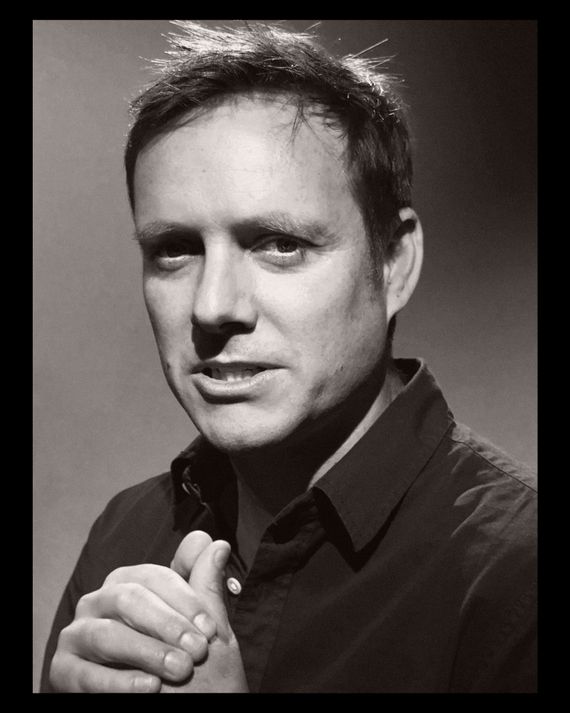

From left: Hamish McKenzie, co-founder, Substack. Imran Amed, founder and editor-in-chief, The Enterprise of Vogue.
From left: Hamish McKenzie, co-founder, Substack. Imran Amed, founder and editor-in-chief, The Enterprise of Vogue.


From left: Jeff Zucker, CEO, RedBird IMI. Radhika Jones, editor-in-chief, Vainness Truthful.
From left: Jeff Zucker, CEO, RedBird IMI. Radhika Jones, editor-in-chief, Vainness Truthful.


From left: Invoice Owens, govt producer, CBS’s 60 Minutes. Carolyn Ryan, managing editor, the New York Occasions.
From left: Invoice Owens, govt producer, CBS’s 60 Minutes. Carolyn Ryan, managing editor, the New York Occasions.


From left: Jonah Peretti, co-founder and CEO, BuzzFeed, Inc. Betsy Reed, editor, The Guardian US.
From left: Jonah Peretti, co-founder and CEO, BuzzFeed, Inc. Betsy Reed, editor, The Guardian US.
Charlamagne Tha God, co-host, The Breakfast Membership.

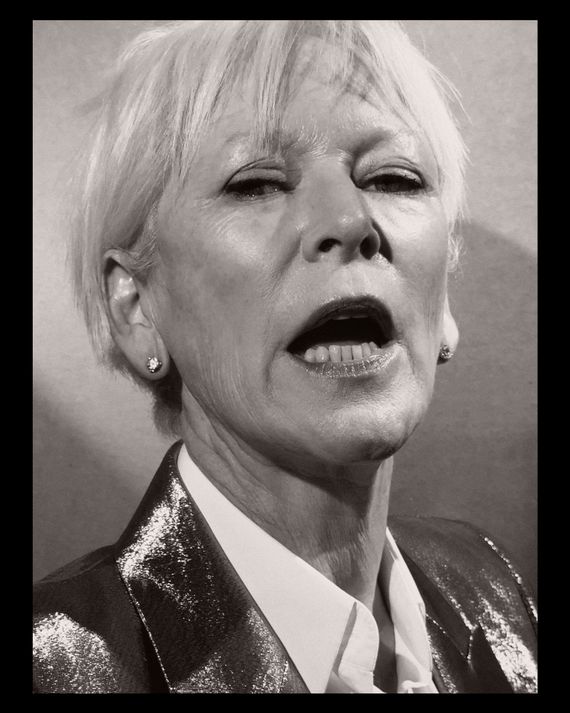
From left: Bryan Goldberg, CEO, Bustle Digital Group. Joanna Coles, chief inventive and content material officer, The Every day Beast.
From left: Bryan Goldberg, CEO, Bustle Digital Group. Joanna Coles, chief inventive and content material officer, The Every day Beast.

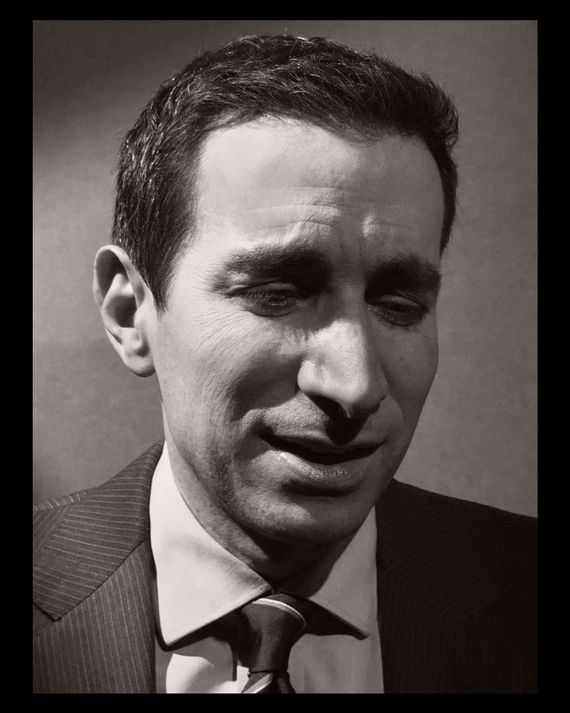
From left: Stephen Engelberg, editor-in-chief, ProPublica. Andrew Ross Sorkin, founder and editor-at-large, the New York Occasions’ DealBook; co-anchor, CNBC’s Squawk Field.
From left: Stephen Engelberg, editor-in-chief, ProPublica. Andrew Ross Sorkin, founder and editor-at-large, the New York Occasions’ DealBook; co-anchor, C…
From left: Stephen Engelberg, editor-in-chief, ProPublica. Andrew Ross Sorkin, founder and editor-at-large, the New York Occasions’ DealBook; co-anchor, CNBC’s Squawk Field.
Emma Tucker, editor-in-chief, The Wall Road Journal.
Nicholas Thompson, CEO, The Atlantic.
It’s a story of two cities. It’s nearly prefer it’s the one % and the 99 %,” says a journalist surveying the sector past the Occasions’ walled backyard. As the remainder of the {industry} scrambles for scraps, the Occasions has turn into the Amazon of legacy media — an every thing retailer for blue-state America’s info wants (and extra). “They’ve bought Wordle and all of the journalism,” says Hamish McKenzie. “Virtually all of the journalism expertise and high quality will get sucked up as a result of it’s changing into the megalith, the large within the room that may’t be stopped.”
“They sit on 10 million paid subs; that’s unlikely to dwindle. That’s only a very highly effective base to function from,” notes one rival editor-in-chief. “They figured it out first — methods to make a killing off recipes and video games that would maintain the remainder of their journalism,” says former CNN boss Jeff Zucker. It’s gotten to the purpose that, in line with one estimate, the Occasions now employs some 7 % of newspaper journalists nationwide. “When different persons are doing one thing higher, they rent their individuals away,” says a digital media govt.
Proper now, the Occasions is thus far forward it’s exhausting to think about anyone catching up. “There’s a dialog that comes up on a regular basis with individuals beginning or working in journalistic enterprises, which is, ‘What’s going to be our Wordle?’” says Bari Weiss. And might anyone else do this? “To not choose on the Occasions, however each reply to success can’t be, ‘Let’s level to the Occasions,’” says one other media govt. “You’re not going to have the ability to replicate the Occasions’ success.” Simply take a look at the brand new supersize app, which mixes the entire paper’s many choices. “It’s like, ‘Our newsroom of two,000 individuals is only one of ten belongings you might be selecting,’” says an editor-in-chief.
“I envy their enterprise mannequin; I don’t envy their newsroom. I believe it’s bloated and sort of self-indulgent,” says a prime newspaper editor.
“They pivoted from being a newspaper for everybody to being a newspaper for his or her core reader,” says Bustle’s Bryan Goldberg. “From a purely enterprise standpoint, that was the proper resolution, however I additionally assume it made the world a a lot worse place, and that’s a tough factor to reconcile.”
Some are desirous to (anonymously) second-guess the Occasions’ enterprise choices, too. “They’ve been horrible with podcasts for probably the most half,” says one media govt. “They spent $550 million on The Athletic once they might have simply spent $100 million and gotten all the perfect sportswriters. It’s like, Oh, you guys don’t know what you’re doing.”
However numerous that simply seems like bitter grapes. “It’s wonderful to me that they’re the piñata of American journalism,” says Stephen Engelberg. “No matter they write, someone’s consistently whacking. They do extra good tales in per week than many people do in months. And you must tip your hat to individuals who can get contained in the Supreme Courtroom in actual time. That’s actually one thing.”
“A part of the issue within the media enterprise has been the collapse of manufacturers, and the Occasions has managed to take care of its,” says Michael Wolff. For a journalistic buccaneer like Wolff, the operations of that model equipment really feel soul-crushing. “You need to work on the Occasions? I’d reasonably kill myself.” The sensation is probably going mutual.
Some of the lauded legacy enterprises that’s not the Occasions is The Wall Road Journal — and many of the credit score goes to its editor, Emma Tucker, who arrived early final 12 months and was instantly confronted with Russia’s arrest of reporter Evan Gershkovich. She additionally needed to rise up to hurry on overlaying a presidential election in a rustic that isn’t hers whereas remaking a considerably bloated and stultified newsroom into one nearer to the lighter-on-its-feet U.Okay. mannequin. And she or he in some way did it. “I believe that they’ve handed the Washington Publish,” observes one veteran journalist.
Her makeover of the paper right into a livelier, extra audience-conscious learn has been extensively praised. “I not often thought-about The Wall Road Journal close to the highest of my ‘enjoyable learn’ checklist previously,” says Occasionsman and CNBC co-anchor Andrew Ross Sorkin, however it’s turn into “much more fascinating and readable. I believe daily I discover extra options which might be accessible and shocking. I really feel the warmth of what they’re doing. I really feel it within the headlines.” New York Publish editor-in-chief and fellow Rupert Murdoch worker Keith Poole enthuses, “She’s introduced a manner of telling a narrative from the headline down that’s far more immediately partaking and a a lot quicker drumbeat of scoops.”
From Elon Musk exposés to being early on Joe Biden’s cognitive decline, “she’s pissed off lots of people alongside the way in which, however it’s a extra fascinating and shocking learn now,” notes one other editor. She had a number of benefits coming in, although: The Journal was early to having a paywall, which its enterprise readers have been prepared to pay for (and expense). Since Murdoch purchased it in 2007, it has turn into the nationwide center-right high quality newspaper. Which implies individuals who can’t abide the Occasions can as an alternative get the Journal. The L.A. Occasions and the Washington Publish, in the meantime, have arguably been preventing for a similar educated, blue-bubble reader.
And in the long run, Tucker additionally bought Gershkovich launched.
Who else is having 12 months?
2Way
“I used to be at a cocktail party and was instructed that somebody well-known was instructed the one individual you must learn to grasp what’s occurring proper now’s Mark Halperin. So I instantly go online to 2Way and I’m like, Wow, it’s like $5,000 or $3,000. He does these nightly Zoom calls, that are like dwell cable tv however with audiences that he’s curating. I used to be simply sitting at dwelling watching CNN at my mother and father’ home and thought, Why am I doing this? I ought to’ve been dialing into his Zoom and listening to from him and all these specialists whom he’s bringing to the desk about whether or not Biden was going to step apart. It was superior. Nancy Pelosi’s former chief of employees was one of many audio system, then he went to Jill Abramson … I’ve been sort of blown away by this, truthfully, as a result of it seems like one thing actually new and actually authoritative.” — Jessica Lessin
The NBA
“Nobody is having a greater 12 months than the NBA proper now. They’ve simply accomplished a historic negotiation that makes their media rights nearly as beneficial because the Nationwide Soccer League’s personal media bundle. And so they have an unimaginable enterprise mannequin with confirmed, engaged homeowners, they usually — the homeowners and Adam Silver — have performed a wonderful job of convincing the three or so greatest leisure firms that their sport is significant to long-term survival within the {industry}.” — Jon Kelly
The Ringer
“It appears to be having numerous enjoyable, they usually’re making an attempt numerous stuff. It seems like they’ve bought momentum.” — Sam Dolnick
Ezra Klein and Bari Weiss
“The celebs of 2024. That is their 12 months.” — Matthew Yglesias
The Every day Wire
“I believe the way in which they’ve been in a position to leverage cultural commentary and increase past the standard viewers that consumes political content material — that’s fairly enviable.” — Glenn Greenwald
Barstool Sports activities
“I imply, look, it’s thus far afield from the way in which I method the world, however they completely have found out methods to seize the eye of a selected cohort and technology of individuals.” — A prime journalist
Name Her Daddy
“What Alex Cooper’s constructing along with her firm — everytime you’re in a position to take one platform, which is the Name Her Daddy podcast, and switch that right into a community that has different podcasts on there which might be simply as huge — you must salute that.” — Charlamagne Tha God
“The group chats, the non-public texts, voice memos. Don’t ever put something in writing.” — Alison Roman • “I believe I might say from the supply.” — Michael Wolff • “Generally my colleagues and companions, however I’ve about three or 4 individuals I speak to nearly daily.” — Jon Kelly • “The events I host.” — A media govt • “Nicely, I get numerous my gossip from Ben Shapiro.” — Jeremy Boreing • “The New York Publish.” — Gus Wenner • “I really feel just like the D.C. bureau of the New York Occasions has higher gossip than the one in New York. At all times. Anyone who’s not in the principle workplace is aware of greater than the individuals there or has gossip about it. They’re all making an attempt to determine what’s occurring on a regular basis.” — A prime journalist • “Group chats. Phrase of mouth on the road. Instagram.” — Mel Ottenberg • “I learn our employees Slack channels, so I’m vicariously studying Lainey Gossip and the Every day Mail. Then clearly I’ve group chats, and most of these are on Sign.” — Radhika Jones • “Cocktail events, in fact.” — Ramesh Ponnuru
Substack launched in 2017, providing journalists bored with giving all their insights away without spending a dime on what was then referred to as Twitter (or of making an attempt to entice readers to their paywalled weblog) a plug-and-play service to launch electronic mail newsletters individuals might pay to subscribe to. And now even Tina Brown has signed on.
However the electronic mail pile-in goes past the solo proprietors, whether or not zoomer or boomer. With the decline of social media typically as a option to distribute information, even the legacy information operations bought within the recreation, launching specialised newsletters hoping to drive site visitors again to their paywalled web sites or as a kind of concierge content-delivery service for his or her subscribers enthusiastic about a selected matter or author. “I’m bullish as a result of it’s comparatively low value and straightforward to do, and a fantastic voice is all you actually need,” says the Occasions’ Sam Dolnick. “It’s a direct relationship between the author and reader.”
However for a e-newsletter to work, it has to offer that reader one thing they assume they want — mental companionship or perception or leisure. Ben Shapiro calls such merchandise “textual extensions of a podcast.”
“Any person like Nate Cohn, who’s our polling knowledgeable — you’ll be able to learn a e-newsletter that could be simply 800 phrases and are available away feeling smarter,” as Carolyn Ryan places it.
Electronic mail isn’t glamorous. “I hate the title, and someone’s going to must provide you with one thing sexier. The time period e-newsletter seems like one thing that comes out of a church basement,” says Graydon Carter, whose publication, Air Mail, has introduced extra journal glamour to emails than any of its friends. “However the good factor about it’s it’s free dwelling supply, and there’s no printing or delivery. If this kind of expertise had existed, no one would ever have invented {a magazine} or a newspaper.” All people will get electronic mail and opens a minimum of a few of it. “I believe probably the most moronic factor I’ve ever heard, when it comes to standard knowledge in media, was that we reached peak newsletters,” says Axios’ Jim VandeHei.
In some methods, the Substack profession monitor has taken the place of the dream of the low-overhead, self-sustaining weblog. As Substack’s Hamish McKenzie attests, it means writers “with the ability to earn a living immediately from the readers as an alternative of hoping that they’ll amass some sort of viewers from which can trickle down some promoting {dollars} or some model offers or one thing like that.”
There’s no query it really works for some individuals. “I do know numerous writers who’ve been in a position to go away their media jobs as a result of they will have a Substack and do actually, actually, rather well, and typically they earn more money,” says Willa Bennett of Seventeen and Cosmopolitan.
However most individuals don’t have sufficient of a preexisting following to make a residing off it.
“It’s nice for Casey Newton, however there’s not that many individuals it’s nice for,” says one media govt. “My understanding of it’s that 5 % of the writers are making 90 % of the cash, which I don’t discover shocking,” says The Every day Beast’s Joanna Coles. Past subscriptions, that cash contains sponsorships, advertisements, the works — like a mini-magazine.
After which there may be the problem of high quality management. “A few of them are incredible, and a few of them might actually use editors and infrastructure,” notes one prime editor. “And the difficulty with platforms which might be distributing them is that there’s not that sort of editorial infrastructure to vet, to push again, to say, ‘Wait a minute — is that truly a narrative?’ or ‘Is that headline honest?’ There simply aren’t sufficient individuals to be the checks and balances. So in some methods, it’s far more just like social media.”
“I pay for Emily Sundberg’s and I pay for Rachel Karten’s.” — Alison Roman • “I pay for Drop Web site Information, which is the Substack began by my previous colleagues from The Intercept. I pay for Zeteo, and I pay for Gradual Boring.” — Betsy Reed • “I subscribe to Hunter Harris, Notes From Auntie’s Desk, Emilia Petrarca, Leandra Medine, Amy Odell, and some others.” — Eva Chen • “John Ellis, Andrew Sullivan, Tina Brown, Joe Klein, Judd Legum, Roger Pielke Jr.” — Matt Murray • “I pay for Nate Silver, Noah Smith, Cartoons Hate Her, Tim Lee.” — Matthew Yglesias • “I pay for Ben Thompson’s e-newsletter.” — Nicholas Thompson • “I don’t pay for Opulent Ideas, however it’s completely my favourite. Emily Sundberg. Casey Lewis. Amy Odell. Emilia Petrarca.” — Willa Bennett • “I pay for Andy Borowitz. And The Free Press.” — Graydon Carter • “Kareem Abdul-Jabbar and Steve Schmidt.” — Gayle King • “I look like paying for most likely 30 or 40 completely different Substacks, which I can’t determine methods to not pay for.” — Joanna Coles
Practically all of the individuals interviewed for this challenge learn a minimum of one of many view-from-inside-a-particular-industry newsletters (from Hollywood to style to the artwork market) that make up the subcription-based Puck. “They’ve numerous swagger. They’ve been profitable in creating buzz. I do know individuals who despise them. I’m assembly numerous executives and studios and different locations who don’t like them, however they eat them. They’re just a little sloppy, too, and I ponder how a lot there may be there,” says one media govt. 4 extra views from 4 extra media executives:
1. It’s Chatty.
“I’m stunned by how a lot I learn Puck. They’ve damaged information, however that complete e-newsletter model — perhaps that’s the way forward for what writing’s going to be now, just a little conversational.”
2. It’s Gossipy.
“I believe they know their viewers and are doing work that you just don’t discover elsewhere. Nevertheless it’s actually only for depraved little gossip. And I believe that most individuals are gossips, or a minimum of most individuals in our {industry}. So to have someone who’s identical to, ‘Right here’s some shit to speak about someone,’ it’s sort of enjoyable. And I believe that’s a factor I might see constructing a enterprise round. That’s not the sort of journalism that I get most enthusiastic about or aspire to, however I believe that there’s a lane for that.”
3. It’s Perhaps Too A lot Enjoyable to Be True.
“I imagine most of their reporting. I imply, in some methods, they’ve gotten issues massively improper that contain me, so perhaps I shouldn’t put that there.”
4. And Personal-Fairness Financed.
“They’ve taken on some huge cash, and I believe it’s just a little bit replicating the mannequin of the earlier decade. You’re simply making an attempt to outrun the cash, however it will definitely catches up.”
At a second with no scarcity of content material, breaking information is what units publications, particularly the upstarts, aside.
“The most important message is to get scoops. I simply assume that the expertise dynamics within the {industry} are altering so quick, and that the worth of doing fairly good work goes down daily, and that you could both play a very important supporting position or actually get away, and there’s much less and fewer house between these two issues,” says Semafor’s Ben Smith.
“It’s a nice time to be within the excellent-journalism enterprise, and it’s a shitty time to be within the mediocre-journalism enterprise. I believe there’s a nice enterprise in hit-driven journalism — the largest scoop, the largest investigative story, perhaps the highest 20 % of what nice journalists and information organizations are doing,” says The Info’s Jessica Lessin. “The fact — and it’s not a straightforward actuality to cope with — is there’s not a fantastic enterprise for the 80 %.”
“I mentioned to everybody right here after a sort of mediocre pitch assembly: ‘Simply to remind everybody, this proper right here is the enterprise,’” says Bari Weiss of The Free Press. “‘There’s not one other secret enterprise. The enterprise is the tales that you just pitch and the scoops that you just deliver to me, and in the event that they’re not good, the enterprise is not going to develop.’”
However scoops don’t dwell very lengthy anymore.
“We’re on this age when information breaks — that are the nice bragging rights of any journalist — are so ephemeral,” says Janice Min. “They disappear nearly immediately as a result of everybody else jumps in and has a sizzling take.”
The decadelong effort to diversify traditionally white and male newsrooms appears to have slowed. Whereas some individuals reaffirmed the concept behind DEI — “In case your ambition is to actually cowl the world because it actually is,” says Occasions assistant managing editor Sam Sifton, “then you could have a newsroom that appears just like the world exterior” — there was a broad sense that the main target has shifted. “Nobody cares about range,” notes a (non-white) govt. “Nobody’s going to be like, Oh my God, one other white man getting the job. I believe we took two steps ahead, one step again.”
One govt says, “I believe being performative about it’s much less of a factor now than it was two years in the past, and thank God.” As a substitute, as a (white) govt places it, these being employed are candidates who “are certified for these jobs reasonably than simply as a result of they aren’t a white male.”
However one draw back of DEI was that not everybody introduced in below its impetus felt supported. One (white) editor says, “I’ve numerous associates, particularly some Black individuals in publishing who I’m shut with, who really feel that there was an actual tokenization. I’ve a pal who’s a literary agent who was introduced into a big expertise home and simply left to start out her personal boutique factor. She was actually being referred to as on to herald a sure sort of perspective — the ‘various factor.’ And that’s probably not what her focus is.”
Entry-level journalists “are usually not almost as gifted because the individuals ten and 15 and 20 years in the past,” insists one newspaper vet. There are many causes which may be the case. “It was that you’d give somebody the recommendation, ‘Go work for a small-town paper after which come to me,’” says Bari Weiss. “Nicely, they’re all gone.”
Mix that with the pandemic and the rise of WFH and also you get younger staffers who by no means had an opportunity to be mentored. “They’re most likely perhaps rather less certified as a result of they’re much less educated; the entire perspective is much less servile than it was,” notes an editor. “You could have people who find themselves — I don’t need to say working fewer hours, however the mode of dues paying has modified lots.”
One govt expressed frustration with Gen Z this manner: “They need every thing immediately. They need every thing quick. They’re super-ambitious within the improper methods. The individuals that appear to me to succeed are those that simply do good work, actually push themselves, and assume the proper persons are going to note. And guess what? The precise individuals at all times discover. The stuff you by no means need to cope with is someone who’s been there for 9 months already asking what your long-term, seven-year plan is. It’s like, ‘You simply bought right here. I don’t have a plan for you but.’” One other editor-in-chief carps, “My greatest pet peeve is when it seems like I’m the instructor they usually’re in sixth grade doing a homework project.”
Maybe unsurprisingly for a gaggle of householders and managers, the rise of media unions over the previous decade was handled largely as a nuisance.
“I’ve at all times been supportive of unions, however I believe the unions at present are completely different and the guilds at present are completely different,” says one govt. “They extra mirror the activists’ posture on social points and every thing else.” The New York Occasions, as standard the {industry} bellwether, has clamped down on worker dissent below govt editor Joe Kahn after a employees revolt compelled the ouster of “Opinion” editor James Bennet in 2020. A prime newspaper editor says, “It’s a must to know the place to attract the road in a information group between activism and professionalism. Kahn has lastly drawn a line with that, and good for him.” Different organizations have struggled with the identical challenge. “You see what occurred on the Washington Publish; primarily, it’s anarchy,” says an nameless govt. “The employees took over the publication and began dictating strikes.”
Outdoors the activist entrance, some felt unions hadn’t delivered to their members. Practically everybody acknowledged that administration’s relationship to employees has most likely modified completely, a minimum of in contrast with when interns have been compelled to work without spending a dime and assistants have been anticipated to dog-sit for his or her bosses on weekends and worse. “You possibly can simply make individuals do no matter, every time,” says Janice Min of the go-get-me-a-salad days of journal editors pushing round their underlings. “Now, there’s only a a lot larger sense of boundary.” Nonetheless, there was some nostalgia for a time when a boss might push their prices to the restrict. “I’m not saying you must come to the workplace, however the individuals who do the perfect work — all of them — work actually exhausting on a regular basis. And you’ll’t say that anymore,” says an govt.
As with DEI, there’s a sense, a minimum of amongst managers, that, within the face of bigger disruptions, the media labor revolution has gone so far as it’s going to go. Beginning wages have been raised, severance offers have been higher formalized, guidelines have been negotiated as to what occurs to the TV or movie rights to an worker’s articles. However many executives recommend you’ll be able to squeeze solely a lot out of a barely worthwhile enterprise.
“Between the years, like, 2016 and 2021, the connection between employers and staff shifted, and it’s shifted again, principally,” says one editor-in-chief. “That was a brief phenomenon that actually strikes me as over.”
“Journalism with a capital J is not any good to anybody if no one’s studying it.” — Emma Tucker • “The newsroom has to grasp that it must align itself with the broader enterprise objectives. It could possibly’t function in isolation. We’re in such a struggle for everybody’s time, and with paid subscription, we’re additionally in a struggle for his or her cash. Each editor might be pondering, once they’re assigning one thing now, What’s the ROI on this?” — Janice Min • “You need to write about Hamas in Israel? Nobody’s going to promote towards that. For those who write a narrative a couple of feminine entrepreneur who’s made it up from poverty, I can promote infinite advertisements.” — Prime editor No. 1 • “1000’s of individuals would kill for these jobs.” — Prime editor No. 2 • “This job is admittedly, actually exhausting, and also you don’t do it by sitting at a desk text-messaging.” — Prime editor No. 3 • “Could possibly be worse. You possibly can be in academia.” — No. 4 • “It’s a tough job and it takes numerous hours and also you don’t at all times get clapped on the again and never everyone will get a sticker.” — No. 5
Within the 12 months since October 7, leaders of stories organizations have needed to defend their protection, not solely to the readers, but additionally to their employees.
“I fearful consistently final fall over alienating our contributors, our readers, and particularly our colleagues. The previous 12 months has helped me be taught and defend the place that we don’t all stand at precisely the identical place on the left, and it’s completely wholesome to comply with the voices of our writers and assist them to greatest articulate their beliefs. I additionally really feel proud — I’m not joking once I say this — that nobody has stop due to what we’ve performed.” — Emily Greenhouse
“Probably the most divisive challenge internally within the final decade, extra so than George Floyd.” — A digital media govt
“I’ve by no means skilled something as intense as that second, and I’ve been main newsrooms for a very long time. The depth and depth of emotion, and the microscopic scrutiny of each phrase and each headline, is like nothing I’ve been via.” — A prime editor
“Breaking via the person private circumstances that persons are feeling and the framing and completely different levels of activism individuals deliver to probably the most fraught topic on the earth — and discovering a option to speak to individuals immediately about these issues in an trustworthy manner that makes clear your expectations with out them feeling challenged, threatened, or that you’ve got an agenda to drive — it’s very exhausting.” — An editor-in-chief
“This story is a special stage. There’s no query about it. I believe you must be additional cautious within the phrases you employ and the way in which you inform the story.” — Gayle King
“It’s actually, actually tough to cowl a conflict if you solely have entry to at least one facet. And so the dearth of on-the-ground reporting from Gaza is admittedly, actually a handicap.” — Stephen Engelberg
“Each topic turned politicized. Every part from our style protection to our artwork protection to our restaurant protection turned proxy for that conflict.” — A prime editor
“I’m going to skip that one.” — An editor-in-chief
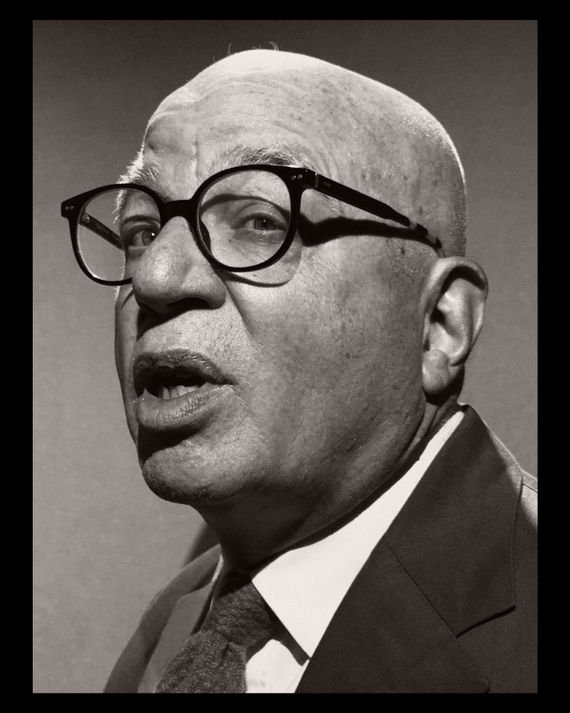
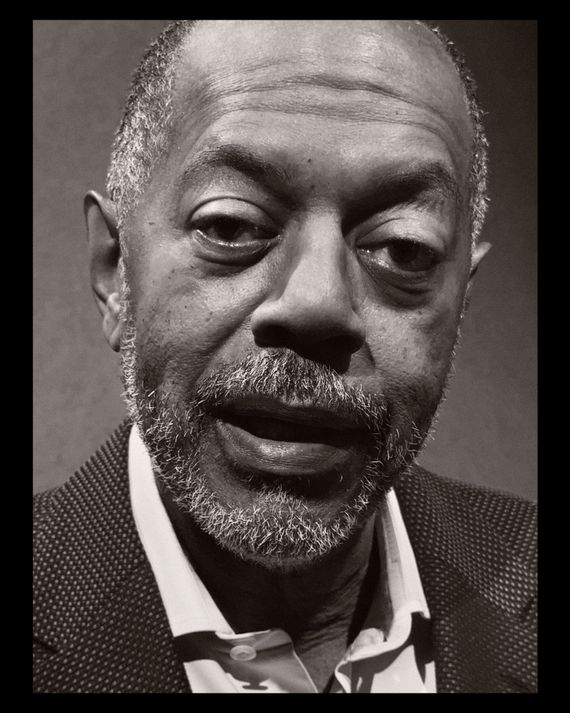
From left: Michael Wolff, writer. Kevin Merida, former govt editor, the Los Angeles Occasions.
From left: Michael Wolff, writer. Kevin Merida, former govt editor, the Los Angeles Occasions.
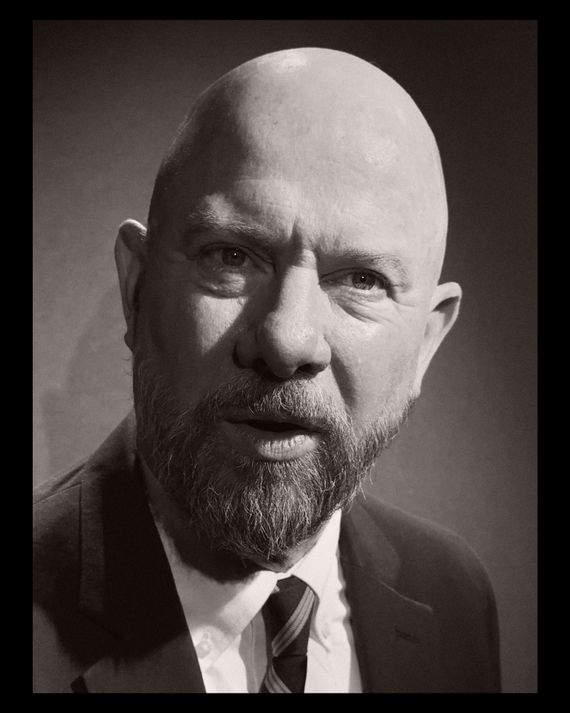
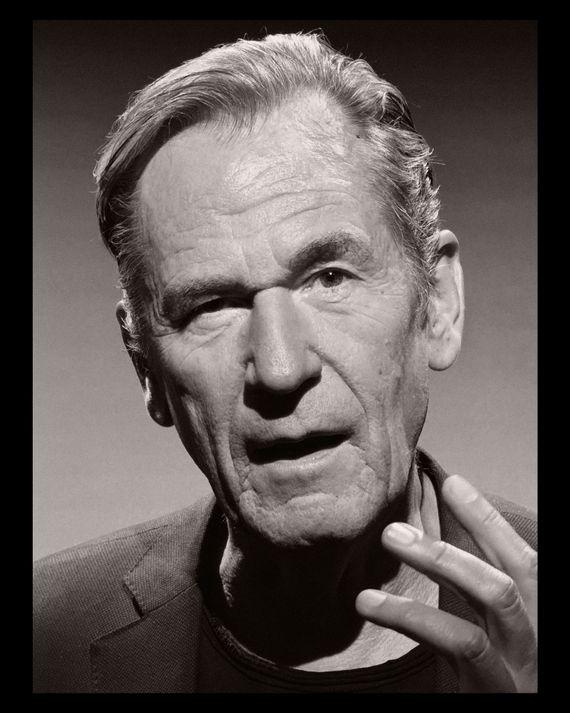
From left: Sam Sifton, assistant managing editor, the New York Occasions; founding editor, New York Occasions Cooking. Mathias Döpfner, CEO, Axel Springer SE.
From left: Sam Sifton, assistant managing editor, the New York Occasions; founding editor, New York Occasions Cooking. Mathias Döpfner, CEO, Axel Springer SE….
From left: Sam Sifton, assistant managing editor, the New York Occasions; founding editor, New York Occasions Cooking. Mathias Döpfner, CEO, Axel Springer SE.
Bari Weiss, founder and editor, The Free Press.
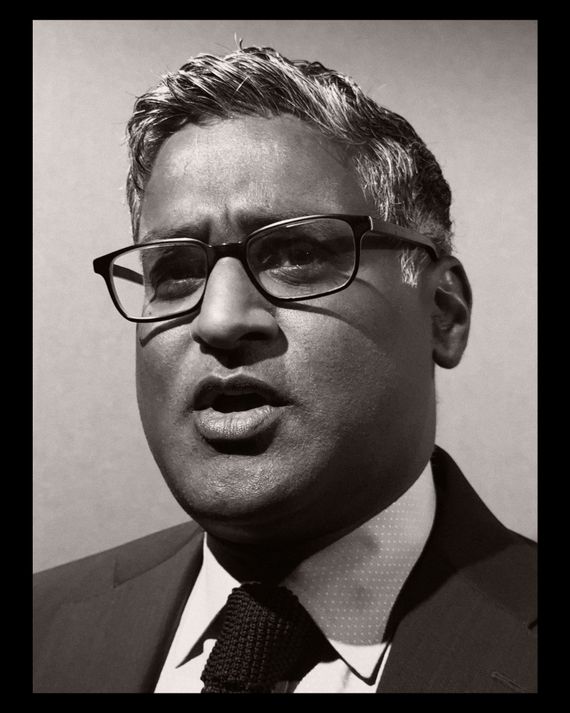

From left: Ramesh Ponnuru, editor, Nationwide Overview. Maer Roshan, co-editor-in-chief, The Hollywood Reporter.
From left: Ramesh Ponnuru, editor, Nationwide Overview. Maer Roshan, co-editor-in-chief, The Hollywood Reporter.


From left: Keith Poole, editor-in-chief, the New York Publish Group. Jessica Lessin, founder and editor-in-chief, The Info.
From left: Keith Poole, editor-in-chief, the New York Publish Group. Jessica Lessin, founder and editor-in-chief, The Info.
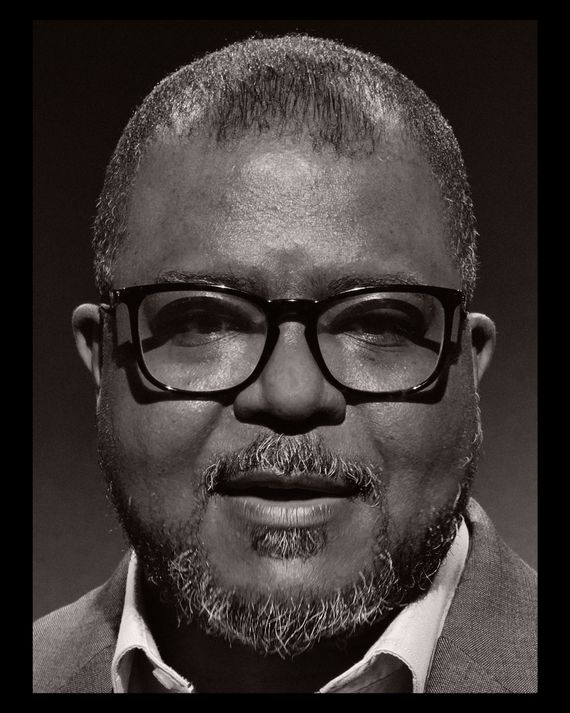

From left: Leroy Chapman Jr., editor-in-chief, the Atlanta Journal-Structure. John Micklethwait, editor-in-chief, Bloomberg.
From left: Leroy Chapman Jr., editor-in-chief, the Atlanta Journal-Structure. John Micklethwait, editor-in-chief, Bloomberg.

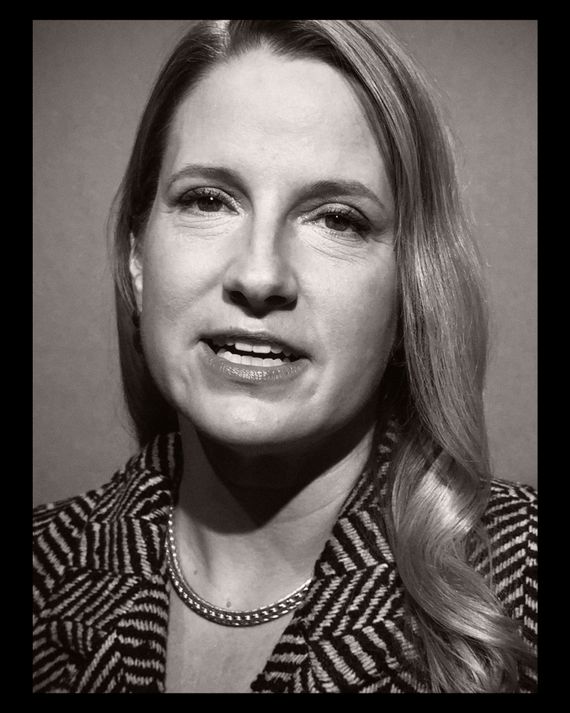
From left: Jake Tapper, anchor and chief Washington correspondent, CNN. Lauren Kern, editor-in-chief, Apple Information.
From left: Jake Tapper, anchor and chief Washington correspondent, CNN. Lauren Kern, editor-in-chief, Apple Information.
Eva Chen, vice-president of style, Meta.
Jimmy Pitaro, chairman, ESPN.


From left: Gus Wenner, CEO, Rolling Stone. Sewell Chan, govt editor, Columbia Journalism Overview.
From left: Gus Wenner, CEO, Rolling Stone. Sewell Chan, govt editor, Columbia Journalism Overview.


From left: Almin Karamehmedovic, president, ABC Information. Emily Greenhouse, editor, The New York Overview of Books.
From left: Almin Karamehmedovic, president, ABC Information. Emily Greenhouse, editor, The New York Overview of Books.


From left: Janice Min, founder and CEO, Ankler Medi. Will Welch, international editorial director, GQ and Pitchfork.
From left: Janice Min, founder and CEO, Ankler Medi. Will Welch, international editorial director, GQ and Pitchfork.
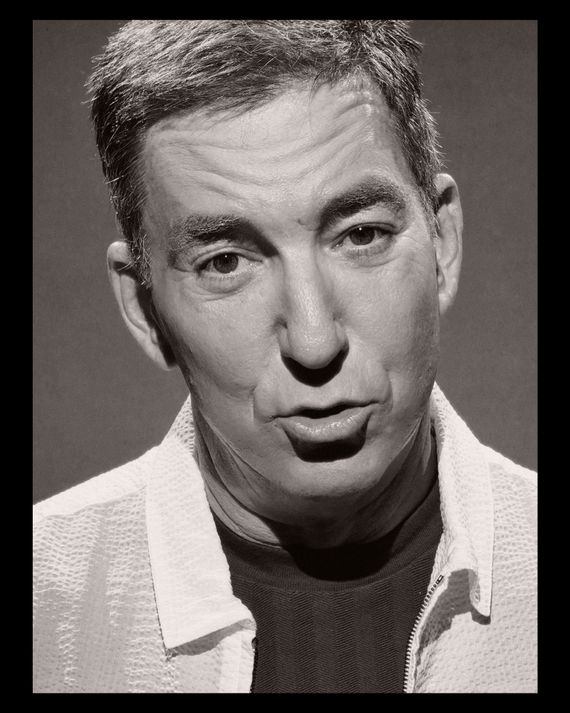

From left: Glenn Greenwald, host, System Replace; co-founder, The Intercept. Matthew Yglesias, author, Gradual Boring; co-founder, Vox.com.
From left: Glenn Greenwald, host, System Replace; co-founder, The Intercept. Matthew Yglesias, author, Gradual Boring; co-founder, Vox.com.
All through the 2010s, the media enterprise was a minter of nice fortunes, and its proprietors — Rupert Murdoch, Barry Diller, Si Newhouse, and so forth. — have been highly effective, influential, and wealthy within the mannequin of Citizen Kane. Within the subsequent tumult of managed media decline, no one has actually changed them. “It doesn’t really feel like there are the sort of people wielding large energy in the way in which that they as soon as appeared to loom over not simply the {industry} however the tradition,” says a prime editor. “It feels just like the older 70s-and-up crowd is sort of heading towards being performed quickly, however no one actually is aware of who the 50s and 60s persons are,” says one media exec. Individuals of that technology who made a play for it, like Jonah Peretti and Vice’s Shane Smith, have been humbled.
It’s not that there aren’t moguls. It’s simply that they’ve much less swag. “Technically, when it comes to the attain of property, I imply, it will be the Roberts household,” which owns Comcast, “or [Warner Bros. Discovery CEO David] Zaslav, I suppose, simply by holding extra property and by holding a bigger viewers,” says Michael Wolff. “However there’s no resemblance to the executives who as soon as ran this enterprise.” “Graydon Carter, Lorne Michaels — you knew who all of them have been,” says a media govt. “Richard Plepler. And so they have been all associates, they usually all felt like they have been operating New York in numerous methods. And I don’t know who that’s anymore.”
Sure: “The supply of his energy is Fox Information, The Wall Road Journal, and the New York Publish. It’s simply an unbeatable mixture that these three properties have a stranglehold on conservative thought in America.” — Jeff Zucker
No: “Nicely, that’s fully idiotic. Simply displaying the truth that no one is aware of shit about what’s going on on this enterprise. Very first thing, Murdoch is 93 years previous and barely sentient. Secondly, a lot of the empire that Murdoch had, good day, was bought off in 2018, which in some way individuals don’t fairly deal with. He continues to have Fox Information, which continues to be a major voice in American politics, in fact. However it’s a much less vital voice than it as soon as was and can proceed to be ever lesser — No. 1, as a result of it’s within the cable-television enterprise, which is in quick decline, and No. 2, as a result of there truly at the moment are real-time significant opponents within the conservative media house anyway. On prime of which, what’s left of the Empire is below monumental, monumental inner stress.” — Michael Wolff
“He’s the richest man on the earth, who controls this huge platform that has a huge effect on what info and what media sources persons are uncovered to. And he has nonetheless a whole lot of tens of millions of followers himself, and he’s actively and overtly campaigning for Trump to be elected president. The diploma of his energy, it’s simply mind-boggling and never in a great way.” — Betsy Reed
“He has an enormous platform, and he exploits the shit out of it.” — Jim VandeHei
“The supply of his energy is his willingness to make use of it on the expense of his enterprise to maneuver politics within the quick time period.” — Ben Smith
“In 2016, if Rupert Murdoch had advocated for a VP candidate to Donald Trump, that individual most likely would’ve turn into the VP. He did that this time with Doug Burgum, and Trump didn’t choose Burgum. Finally, he was listening far more to the Elon Musks and Peter Thiels of the world.” — Kaitlan Collins
There have at all times been rich individuals who need the standing, affect, and a focus you get from press possession. “You’re asking if self-importance and ego are nonetheless a factor on the earth, and they’re going to at all times be,” says one govt. The distinction at present is that media properties are now not superb companies, which implies they typically entice the curiosity of a special sort of wealthy individual — both charitable or, probably, delusional. Each sorts have a combined report of late.
“I don’t assume they’re critical gamers within the enterprise sense,” says Hamish McKenzie of the present class of media benefactors. “I believe they’re simply proudly owning — they’re selecting up previously prestigious manufacturers as trophies for his or her cabinets.” Billionaire possession “retains some individuals employed, and it retains these cherished establishments alive in some methods,” he says. However the publications supported like this “are largely simply on life assist. They’re not truly main cultural gamers anymore.”
A billionaire proprietor “definitely makes it simpler to have time to determine your choices,” says Politico’s John Harris. Due to that, a rich white knight is one thing many individuals working for financially shaky high-status operations are hoping for. “Somebody will at all times take their cash,” says Janice Min, likening it to the Medicis’ patronage.
However finally, the nice feeling wears off and the Medicis start to resent their countless examine writing to self-regarding journalists unwilling to adapt. “I haven’t actually seen many billionaire benefactors who’re sort of detached to the enterprise efficiency of the property,” says Harris. “That’s simply not the way in which it really works,” provides an govt. “Marc Benioff needs Time to earn a living. Individuals don’t get that as a result of they assume individuals a lot richer than them cease caring about cash. Truly, that’s not the case. It’s people who find themselves a lot richer than them who care obsessively about cash.” Although they’re typically extra affected person than, say, venture-capital corporations, finally their charitable impulse runs low. “You don’t turn into a billionaire by letting your properties lose cash indefinitely,” notes one other govt.
In addition to, having such assist can, in that sense, be stifling to the enterprise mannequin. “The Washington Publish and the L.A. Occasions are clearly the actual living proof right here,” says an editor-in-chief, “the place billionaire possession meant they by no means actually took severely constructing a enterprise. And sooner or later, the billionaires get uninterested in that.”
“Simply as soon as, I wish to see a billionaire-backed enterprise mannequin in media, versus only a billionaire subsidizing a damaged enterprise mannequin,” says Jeremy Boreing.
“It’s excessive on my checklist of organizations which have stumbled,” says Stephen Engelberg. Many individuals felt it was in a robust place in contrast with different regional papers — if nothing else as a result of the area is so rich and influential. “I don’t assume they found out methods to be indispensable in California,” notes a prime editor. “I believe that they tried to be a smaller New York Occasions, however there already is the New York Occasions,” says one other prime editor.
“Possession is vital. By no means underestimate that, as they are saying. It’s a cliché, however it begins on the prime,” says a veteran newspaperman. In 2018, Patrick Quickly-Shiong, a biotech billionaire, purchased it. “I believe what occurred there was a well-meaning however way-in-over-his-head proprietor who was principally extorted to rescue an exquisite however almost doomed hostage for $500 million or no matter,” says an editor-in-chief. Then he put extra money into it however didn’t repair the issues. “It’s gone improper over too a few years. The unionization has made every thing dearer. Print is dying, but the employees is so not digitally centered sufficient,” they are saying. “The employees actually didn’t have the ability units obligatory to attain a turnaround. And the New York Occasions, by the way in which, in 2008, didn’t have these ability units both, however it managed individuals out who refused to alter it, purchased out an entire bunch of older individuals, employed an entire bunch of recent individuals, after which didn’t lay them off because the L.A. Occasions did.”
In 2021, Quickly-Shiong employed Kevin Merida as editor, however he left early this 12 months; it has been reported that the 2 clashed. Others within the newsroom have complained in regards to the proprietor’s very progressive daughter taking too shut an curiosity within the paper’s protection. (The paper has since reduce 20 % of its newsroom.)
One other factor it by no means did: Because the Hollywood trades went digital (with Jay Penske shopping for up Selection, The Hollywood Reporter, and Deadline) and The Ankler and Puck competed for the insider, the L.A. Occasions didn’t turn into a participant in that — its dwelling market. “Every part about them is so ideological, flat,” says a media govt. “I bear in mind ‘Are Freeways Racist?’ as an ideal instance of an L.A. Occasions story.”
So what’s to be performed? “My hope is that the L.A. Occasions fights its manner out and follows extra of the trail of the Boston Globe,” a regional paper that has a strong digital subscription enterprise, says one other media govt. “However there’s sort of a cycle the place you lose your greatest writers, you lose your greatest individuals, you then begin to do issues to attempt to make your mannequin work, and you then’re in an actual downside.”
It wasn’t so way back that the Washington Publish was on a roll with Jeff Bezos’s checkbook backing up Marty Baron’s editorial management. Bezos purchased the Publish in 2013 for $250 million after the paper’s lack of digital technique — each Vox and Politico have been based by Publish refugees — put its future in peril. He invested deeply to increase the newsroom. On the peak of the so-called Trump Bump, below its “Democracy Dies in Darkness” slogan, digital subscriptions surged. However some argue the chaotic newsmaking presidency of Donald Trump masked a bunch of shortsighted enterprise choices. “The Publish and the Occasions had an enormous run-up through the Trump administration, and the Occasions used that point to diversify into video games and well being and life-style gadgets, cooking, and the Publish simply acted as if this second would final without end,” says {a magazine} editor. However after that, in contrast to the Occasions, the Publish didn’t have a plan for what to spend money on subsequent that wasn’t politics, and after Baron left and was changed by Sally Buzbee — then-publisher Fred Ryan’s choose — even that protection appeared to lose its edge.
“They hadn’t constructed a sustainable editorial mannequin that would assist itself, post-resistance Trump period. And so they employed among the improper individuals,” says one other media govt. In the meantime, the Publish missed out on the arrival of a brand new period of political and coverage protection, permitting opponents to crib its viewers.
“The Washington Publish is screwed. They screwed themselves, perhaps eternally,” says a digital-media govt. “Gross mismanagement, lack of a technique, crappy tradition, advanced unions, permitting too many individuals from Politico to Axios to the New York Occasions to personal classes they as soon as had an opportunity to personal.” As Bari Weiss says, “They need to dominate D.C. They need to get each scoop associated to the federal authorities. And so they simply don’t.”
Even Bezos’s efforts to repair it of late have led to extra tumult. This summer time, it got here out that his new writer, Will Lewis, who arrived on the prime of the 12 months, had tried to shunt Buzbee into a brand new gig operating a “third newsroom” centered on service and social-media journalism. However Buzbee stop, and Lewis’s hand-picked crony alternative for her, a Brit named Robert Winnett, was compelled to step again after accusations of being too Fleet Road. One other onetime Lewis affiliate, Matt Murray, earlier changed within the prime Wall Road Journal job by Emma Tucker, was introduced in to be interim editor. Now, many individuals assume he’ll simply find yourself staying on.
“I believe what’s happening on the Publish is just a little regarding. This speak about a 3rd newsroom, I don’t actually perceive it,” tsk-tsks a rival prime editor. Others are much less harsh. “I believe the third-newsroom thought is nice. Horrible branding, however it’s good,” says a media govt. “The present industrial facet of the Publish is run by individuals who perceive the subscription mannequin. I believe it’s far more clear now that they’re centered,” says an editor. And as Ben Smith notes, “the Washington Publish remains to be the Washington Publish. Washington remains to be a spot. Political information remains to be a factor. I believe they’ll finally discover their option to shopping for Punchbowl and making an attempt to eat Politico’s lunch.”
The rumor proper now’s that Will Lewis needs to get Jeff Bezos to open his pockets. That may be a throwback to 2021, when Axel Springer purchased Politico for about $1 billion, and 2022, when the Occasions purchased The Athletic for $550 million and Cox Enterprises dropped $525 million on Axios. The final two are considered skeptically at present. The Occasions continues to lose cash on The Athletic, and, in line with one media govt, “Cox manner overpaid, and Axios doesn’t make any cash.” (Earlier this 12 months, Axios laid off about 10 % of its workforce.) Not that Axios, which was based by Politico and Publish vets Jim VandeHei and Mike Allen (together with Roy Schwartz) in 2016 to create primarily a PowerPoint presentation of stories (a.okay.a. “Good Brevity”), doesn’t have its defenders. “In moments of peak political pleasure, Axios AM remains to be a model of the Occasions homepage to me,” says Jon Kelly. However as Janice Min notes, “To not be dire, however it seems like Axios and The Athletic are going to go down as the 2 luckiest locations that bought a whole lot of tens of millions when you nonetheless might.”
If it could actually solely attain a really elite viewers and get sufficient of them to return to dwell occasions.
Semafor, based by Ben Smith and Justin Smith in 2022, fancies itself a world information group with a small workforce of journalists based mostly within the U.S., Africa, and, most lately, the Gulf. “What I’m seeing is a curated, cost-effective, centered method to fascinated about methods to share and speak about content material,” says Matt Murray, “and a cautious method to development. And it’s telling me one thing about how information is evolving.” Semafor launched having raised $25 million from varied wealthy individuals, and due to the prominence of the Smiths within the enterprise, many individuals signed up for its newsletters. Semafor’s scoops, once they come, typically have resonance. Nevertheless it’s nonetheless scrappy. Occasions — curated dwell journalism gatherings that includes heavy hitters throughout politics, enterprise, and tech — turned out to be half of their enterprise. Semafor claimed to have achieved a number of months of profitability in its first full 12 months, with 50 % of income coming from occasions, and final 12 months made greater than $10 million in income, cut up between promoting and occasions. Semafor additionally struck a cope with Microsoft, which is sponsoring an AI “breaking-news feed.” Early reviews mentioned the Smiths had deliberate to evolve right into a paywall mannequin, however they haven’t performed so but; as an alternative, they’re grabbing income the place they will.
“We’ve got to watch out about not utilizing the ‘in peril’ narrative an excessive amount of, the place individuals will assume it’s already all lifeless and there’s nothing left to avoid wasting,” says CJR’s Sewell Chan, who spent three years operating the nonprofit Texas Tribune. Chan factors to 2 vibrant spots in efforts to assist native information: the Nationwide Belief for Native Information, which acquires weak group papers and invests of their improvement, and the American Journalism Challenge, which tries to rebuild native information by seeding native digital start-ups.
Viewers curiosity in native tales is excessive, Apple Information has discovered. “That’s a part of what we’re making an attempt to do — join native information retailers with their audiences once more,” says Lauren Kern of Apple Information. “After the Apalachee faculty taking pictures earlier this fall, we relied on the Atlanta Journal-Structure for protection,” she notes. “The North Dakota state abortion ban was dominated unconstitutional, and we now have the North Dakota Monitor to actually put on the prime of a nationwide information app.”
Amongst different experiments are small, typically worker-owned or nonprofit newsrooms across the nation. San Francisco has 27 information organizations — about the identical because it had a decade in the past, because of a mixture of nonprofits, radio stations, and, sure, the largesse of assorted wealthy individuals, of which town has no scarcity. In New York, there’s the swashbuckling Hell Gate and the extra self-serious nonprofit The Metropolis. However there’s additionally the Murdoch-owned New York Publish, which has survived by changing into, as its editor Keith Poole places it, “a nationwide digital model.” Which means it peddles nationwide information, tabloid sensationalism, gossip, and Fox Information–adjoining speaking factors that make it typically appear to despise the very metropolis it’s based mostly in. “We’ve got to deal with our information very in another way domestically and nationally. Not all readers will essentially be enthusiastic about schooling coverage in New York Metropolis,” Poole says. “We’re worthwhile — little-known reality. We’ve been worthwhile for the final three years in a row.”
The most important menace to native information is hedge funds like Alden World Capital which have wolfed up after which gutted regional papers throughout the nation. “These are both zombie newspapers or soon-to-be-zombie newspapers. I don’t know in the event that they’re going to make it,” says Stephen Engelberg.
The Atlanta Journal-Structure, although, is owned by Cox Enterprises, a family-owned firm that gave the paper a multiyear constructing plan. “There’s a distinction between managing decline and investing in transformation,” says editor Leroy Chapman Jr. However, by and enormous, “the enterprise mannequin for native information is damaged. It truly is,” he provides. “There must be, among the many public and amongst elected officers, a recognition of how very important native information is to thriving communities” and “public funding” in defending it. “We’d like some assist to have a enterprise mannequin that lets us recoup pretty what we should always, based mostly upon what we produce, and that can present the kind of factor our democracy wants, which is goal reality.”
“It’s like a digital model of a basic journal. In order that’s actually a special sort of supply. I believe they could be a actually beneficial contribution to the voice, and I believe they are often fascinating. However I believe (1) the economics are nonetheless powerful, (2) the viewers development could also be restricted, and (3) it’s numerous work to maintain them fascinating and hustle your viewers and maintain them engaged and maintain them going.” — An editor-in-chief

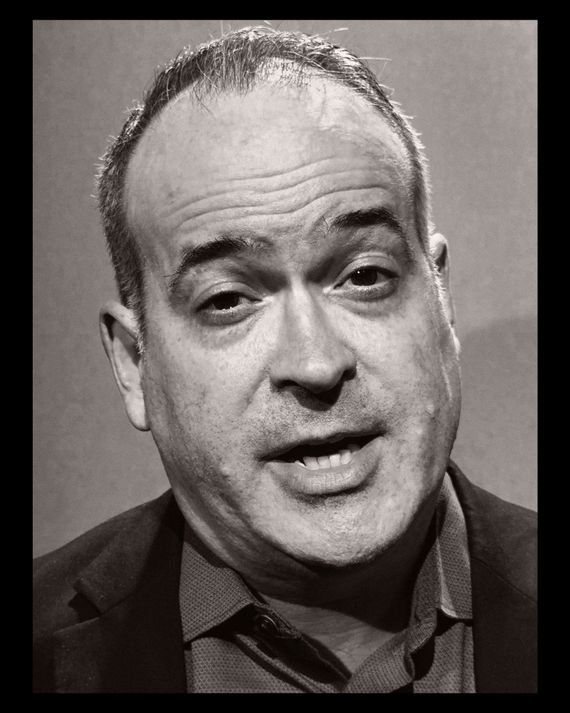
From left: Jeremy Boreing, co-founder and co-CEO, The Every day Wire. Matt Murray, govt editor, the Washington Publish.
From left: Jeremy Boreing, co-founder and co-CEO, The Every day Wire. Matt Murray, govt editor, the Washington Publish.

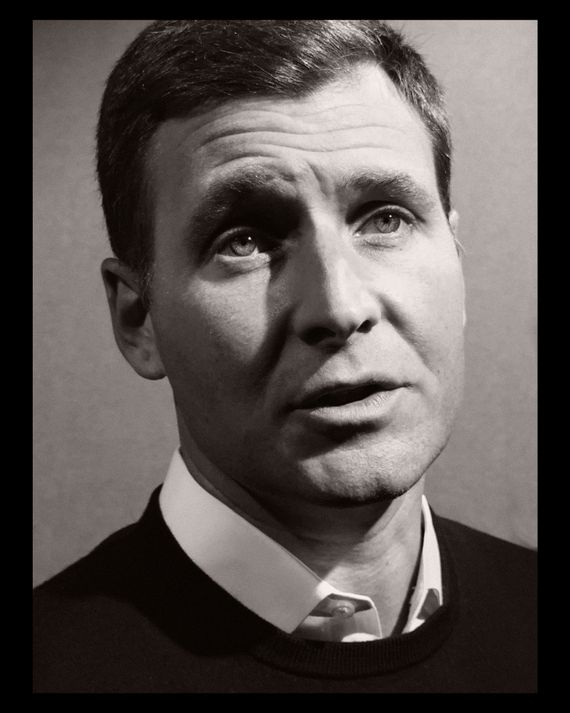
From left: Alison Roman, author and chef. Jon Kelly, co-founder and editor-in-chief, Puck.
From left: Alison Roman, author and chef. Jon Kelly, co-founder and editor-in-chief, Puck.
Neal Mohan, CEO, YouTube.
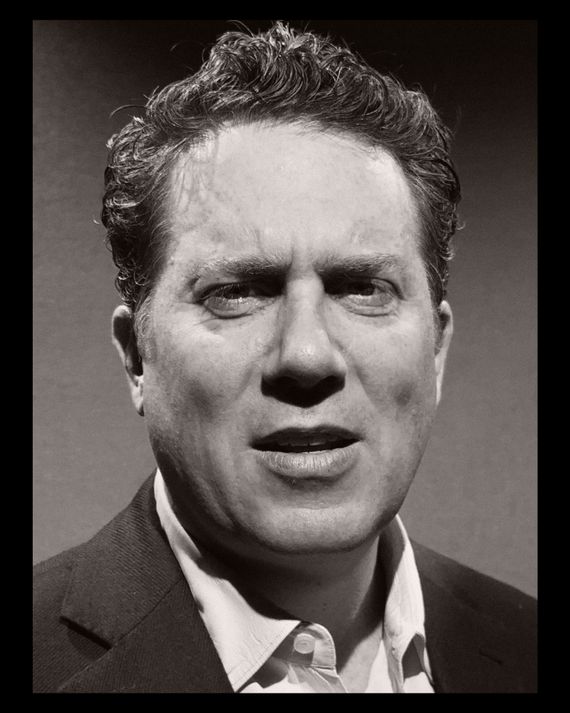

From left: Ben Smith, co-founder and editor-in-chief, Semafor. Simone Swink, senior govt producer, ABC’s Good Morning America.
From left: Ben Smith, co-founder and editor-in-chief, Semafor. Simone Swink, senior govt producer, ABC’s Good Morning America.
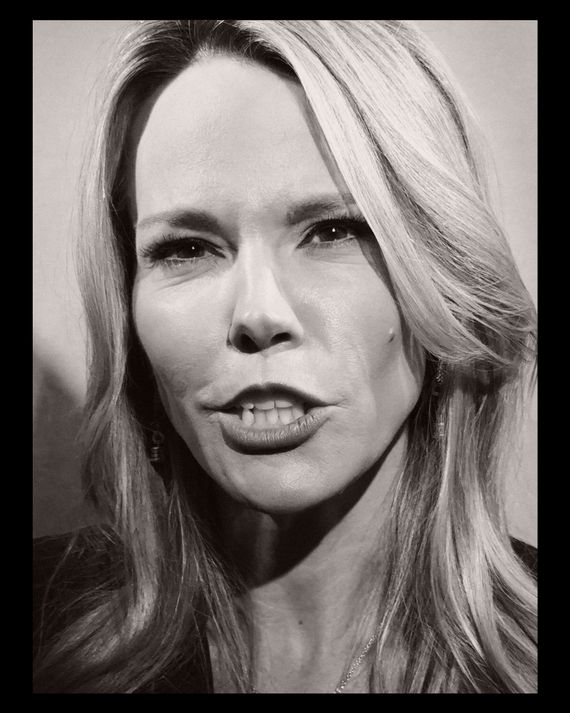

From left: Wendy McMahon, president and CEO, CBS Information and Stations and CBS Media Ventures. Jim VandeHei, co-founder and CEO, Axios; co-founder, Politico.
From left: Wendy McMahon, president and CEO, CBS Information and Stations and CBS Media Ventures. Jim VandeHei, co-founder and CEO, Axios; co-founder, Politi…
From left: Wendy McMahon, president and CEO, CBS Information and Stations and CBS Media Ventures. Jim VandeHei, co-founder and CEO, Axios; co-founder, Politico.
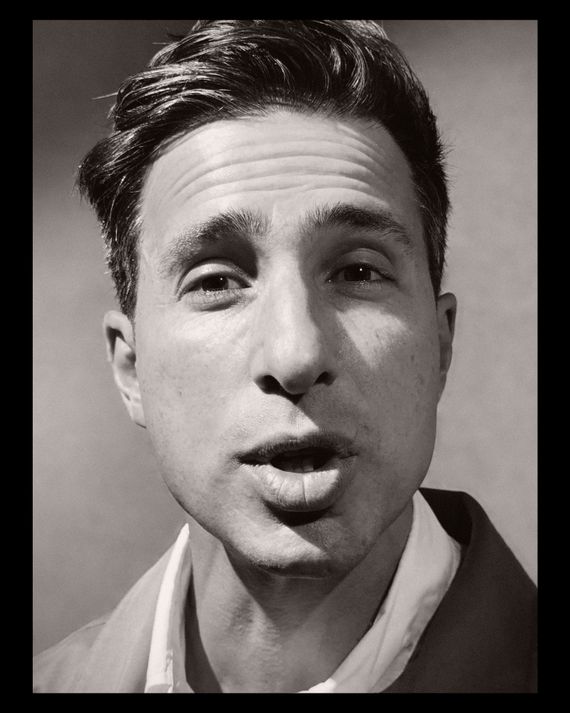
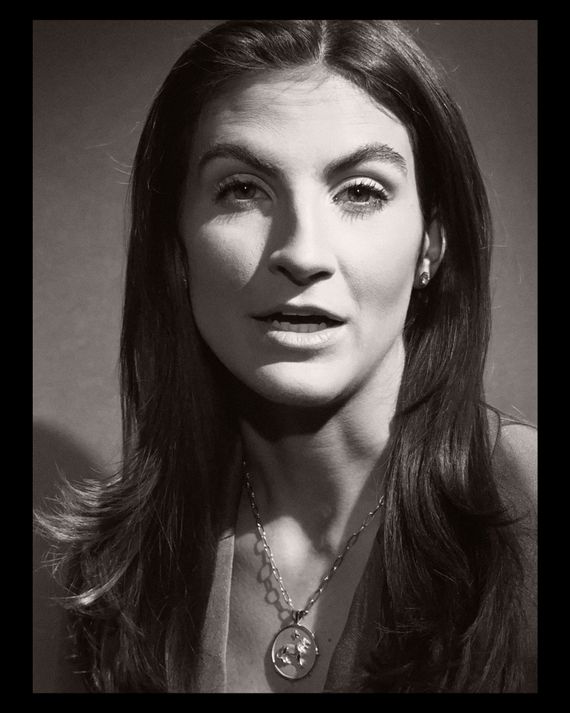
From left: Sam Dolnick, deputy managing editor, the New York Occasions. Kaitlan Collins, anchor, CNN’s The Supply.
From left: Sam Dolnick, deputy managing editor, the New York Occasions. Kaitlan Collins, anchor, CNN’s The Supply.


From left: Ben Shapiro, host, The Ben Shapiro Present; co-founder, The Every day Wire. Samira Nasr, editor-in-chief, Harper’s Bazaar.
From left: Ben Shapiro, host, The Ben Shapiro Present; co-founder, The Every day Wire. Samira Nasr, editor-in-chief, Harper’s Bazaar.
Graydon Carter, founder and co-editor, Air Mail.
Willa Bennett, editor-in-chief, Cosmopolitan and Seventeen.
“Beats the shit out of me.” — Jim VandeHei
“Oh, you’re humorous. Any media operator who seems on the unit economics of print may have a tough time answering that query.” — Jon Kelly
It’s not fully out of date and has turn into a manner for publications to draw and retain subscribers and lure in each celebrities and high-end writers who nonetheless care about showing in print (simply the opposite week, The Atlantic introduced it was upping its frequency from ten to 12 print points a 12 months). And magazines are nonetheless driving the pandemic luxury-fashion growth; these style advertisers are hungry for shiny pages to seem in.
“Print is a luxurious merchandise.” — Mel Ottenberg, editor-in-chief, Interview journal
“I’m making an attempt to consider what to say as an alternative of ‘a enterprise card,’ however it actually is sort of a enterprise card. It’s a manifesto for what your model stands for.” — Willa Bennett
“We clearly care deeply about print, however when it comes to development, it’s not the place our focus is.” — Emma Tucker
“Keanu Reeves, Frank Ocean, Rob Pattinson, Beyoncé — they aren’t coming to a GQ Instagram shoot.” — Will Welch, international editorial director, GQ and Pitchfork
Magazines Nonetheless Want Movie star Covers …
“It’s an unimaginable level of entry, and it provides us the chance to create an iconic picture with a degree and a function and a message that then permeates all our different platforms. Chappell Roan was shot by Inez & Vinoodh, and he or she’s at this unimaginable second in her rise in her profession, and it’s a deep interview and the author spent days along with her, and with out print, that wouldn’t have occurred. After which there’s video and all these different property. Print is the tip of the spear, however the majority of it’s digital. The impression of it, the symbolism of it, opens a door for us. That’s actually, actually important.” — Gus Wenner
And the Celebrities Nonetheless Want Them, Too.
“Magazines will not be as vital as they have been a decade in the past, however the struggle to get on covers has by no means been larger. And that’s as a result of there are ten occasions as many well-known individuals now as there have been a decade in the past. And on common, every of them is one-tenth as well-known apart from Taylor Swift. There’s lots of people clamoring to be acknowledged and to get that cowl.” — Bryan Goldberg
“Having a canopy of Vogue or Vainness Truthful or doing one thing which may change their picture, or doing one thing that could be a breakout, Star Is Born second for them — being on the duvet of W, as an illustration — the place it sort of casts them in a brand new gentle, maybe an edgy gentle, I nonetheless assume it has numerous impression.” — Eva Chen, vice-president of style, Meta
“It’s an endorsement, and it’s a sure diploma of validation that you just don’t get if you happen to simply keep by yourself channel and in your personal world.” — Samira Nasr, editor-in-chief of Harper’s Bazaar
Celebrities, Although, Now Have the Higher Hand.
“Some individuals would say to you [after seeing the Beyoncé GQ cover, for which she conducted the interview with the writer over email], ‘Nicely, a minimum of she gave them an electronic mail interview.’ Usually, she doesn’t speak. Different individuals would say to you it’s an actual demonstration of how conventional media manufacturers like GQ and Vogue have misplaced their energy to name the pictures in interviews like that. And the reality is these media manufacturers, they actually depend on these huge covers to generate dialog and to telegraph their energy and affect, that are undeniably waning within the period of social.” — A digital media govt
“It’s Not Sufficient to Simply Have a Cowl.”
“I do assume that having a very refined and 360-degree method to a canopy and to a second and to a problem is important. It’s not sufficient to simply have a canopy. It’s a must to take into consideration what’s the actual technique — what are the sound bites that will likely be all over the place on Reels? Like, any journal that’s not sending a social-media individual on set for the duvet to get behind the scenes is frankly behind.” — Eva Chen
However Additionally, What Even Is a Cowl Anymore?
“The state of the fashion-magazine cowl is considerably diluted by the truth that something could be a cowl. So anybody might put an enormous brand on a picture and name it a canopy. And types — even actually, actually prestigious media manufacturers — are doing digital covers, no matter meaning, proper?” — Imran Amed, founder and editor-in-chief of The Enterprise of Vogue
Resuscitations and expansions of print merchandise introduced previously 12 months: The Atlantic, Advanced, i-D, Life, Nylon, Saveur, Sports activities Illustrated, and Vice.
Editors maybe envious of the writer’s assets via the years had lots to say about the way it squandered them. Right here’s one such tirade from an nameless govt.
“I imply, Condé Nast is probably the most pathetic firm I’ve ever seen in my life. They’re so silly. And a few of it’s just like the hubris of Nineties media. You’re sitting there, believing you rule the world, not understanding the world has fully modified and fallen out of your grasp, however you continue to conduct your self with a vanity that finally the market rejects. It’s so bananas, and the truth that they don’t change that complete mannequin there may be wild. They assume their manufacturers imply greater than they do, and due to this fact they method the market with an hauteur round sponsorship and advert gross sales, and but they’ve turned all of the content material into content-farm stuff on the similar outing of necessity.”
(Roger Lynch and Anna Wintour declined to take part on this challenge.)
Regardless of cord-cutting and growing older demographics, the individuals who make TV information appear assured they’ll discover a option to maintain doing just about what they’re doing — whereas discovering new methods to distribute it.
“The underside line is that the overall time spent with our authentic programming throughout tv and streaming mixed is definitely up 12 months over 12 months,” says CBS Information’ Wendy McMahon. “While you take a look at the overall time spent — with the lion’s share of it nonetheless on tv — it’s nonetheless a attain automobile. Are there declines? Sure. Is it comparatively steady? Sure.”
Says one other TV govt, “By way of viewership and availability, information is extra profitable than ever as a result of it’s extra obtainable than ever. You may entry information on all platforms, not simply linear, however via social-media platforms from Twitter to Fb to getting your information on TikTok.”
However nobody is aware of what’s subsequent, precisely. “One thing huge is about to occur,” says one other prime TV govt. “There’s little doubt about that, whether or not or not megastreamers turn into the platforms for a few of these information divisions or networks resolve simply to offer a few of their content material to the streamers. There’ll be some kind of consolidation.” A senior TV govt says, “You possibly can see a mixture of tie-ups, maybe with among the streamers. It could be actually fascinating if Netflix or Amazon determined to enter information.” “I believe the legacy within the model helps lots,” says 60 Minutes govt producer Invoice Owens. “We haven’t deviated or modified. It nonetheless seems the identical. The story choice is identical.”
In different phrases, regular as she goes. “Nicely, the trail ahead for CNN, I believe,” says anchor Jake Tapper, “is for us to maintain doing what we’re doing and offering an try at honest and goal information that’s not ideologically pushed. And I believe that’s the recipe for ABC, CBS, NBC, and PBS as effectively. How can we maintain that going on this world of cord-cutting and smartphones and one million new sources and the like is for larger brains than mine to determine.”
“Why is an anchor on a tv community making between $10 million and $20 million a 12 months, however an analogous expertise on social media doesn’t take pleasure in the identical income and wage alternatives? There are structural causes within the enterprise which have defined that, they usually’re shifting actually rapidly. And I believe that these are as vital in lots of circumstances because the story that these firms inform.” — Jon Kelly
“The times of those ridiculous anchor salaries must be over. It’s not value it. The enterprise mannequin doesn’t assist it any longer. For those who have been to mix all of the GMA anchor salaries, I assure you their news-gathering funds is lower than that.” — A TV govt
“Rachel Maddow’s deal wouldn’t occur at present. If I’m paying you a ton of cash, then I count on you to be all over the place. I count on you to be on within the mornings, to be in prime, to do this podcast, to host this occasion. There’s a little bit of an ROI that ought to be a part of this course of.” — A information govt
“Networks will at all times determine a option to pay once they need to pay … Nobody has ever mentioned to me, ‘They slashed my wage.’”
Youthful individuals don’t have a tendency to look at community TV or pay for cable. As a substitute, many have grown up getting their information on YouTube. Information divisions are following them. Take ABC: It isn’t “producing vastly completely different content material for YouTube, however we’re hitting almost 18 million subscribers,” says ABC Information president Almin Karamehmedovic. “The demographic is manner youthful than what we now have on linear tv.” Which means that the issue for TV information isn’t a lot what they make as the place they put it. “The principle factor we do is distribute their content material in a manner that customers, particularly youthful customers, need to eat it,” says YouTube CEO Neal Mohan. “We constructed merchandise that cater to that information use case. So we now have the breaking-news shelf when there’s an enormous occasion occurring. We’ve got prime information and search outcomes. We’ve got a local-news shelf.” And never simply TV information: “If we do a profitable video, its views on YouTube simply dwarf its views on our platform,” observes one newspaper editor. Together with podcasts, it’s one other option to attain individuals. “The surge of video podcasts — individuals desirous to spend extra time on their screens and wanting to look at someone looking at their display — was an enormous shock to me,” says Sam Dolnick. Charlamagne Tha God, whose radio present can also be a YouTube hit, says it’s about adaptation. “Tv has developed into what persons are watching on-line,” he says. “It’s simply viewing habits, proper?”
After we requested what the most typical false impression in regards to the media is, we heard the identical factor time and again: “That it’s all an interconnected company conspiracy with an agenda to propagandize,” says Washington Publish govt editor Matt Murray. The fact, says Guardian US editor Betsy Reed, is that the way in which an enormous story will get coated within the “mainstream media” (which means, journalistic entities not particularly aligned with the left or the proper) “is admittedly about particular person reporters and editors making the selections they assume are proper within the second. And if that then finally ends up which means there are 17 tales revealed on the identical day, that doesn’t essentially imply that was a plan by the editor. It’s the way in which issues performed out in a newsroom, which consists of lots of people who’re usually making an attempt to do the perfect, most accountable job they will within the second.” Or as Graydon Carter says, “Some individuals within the political spectrum assume that particular person components of the media work in dramatic live performance with one another, and that’s simply merely not the case. In actuality, it’s one million mice operating round in a cage, all with completely different trajectories, and all with completely different objectives.”
“The Biden White Home specifically cares in regards to the New York Occasions. And if you happen to take a look at what the Occasions did from the editorial web page and the way they stacked the editorials day after day from the columnists whom Biden cared most about, all calling for him to step down utilizing very comparable language and themes — “Do it! Be a hero like Washington was!” — I believe that psychologically performed a job. When he misplaced Morning Joe, that mattered as a result of each he and his workforce legitimately do watch it regularly. So there’s nonetheless moments when mainstream media can roar, however they’re simply much less frequent and heard by fewer.” — A digital media govt
“The media is very highly effective in terms of simply forming, What’s the narrative of the day? Let’s put it this manner: If the media have been much less highly effective, I believe Joe Biden may nonetheless be the nominee. The media principally spun up the narrative within the aftermath of the primary debate that Biden needed to inevitably go. Think about if the media had pushed the opposite manner and mentioned, ‘You already know what? It was a foul efficiency. It was a one-off like what Biden was saying. He’s completely nice.’ Would the Democratic donors have gotten onboard to throw him off a cliff?” — Ben Shapiro
“The factor in regards to the debate is the eyes noticed what they noticed, everyone noticed it, so it gave you a window. However day-to-day — having coated the presidency — it’s actually exhausting. You may’t stroll across the West Wing; you cowl it from afar and you then depend on individuals inside. And I don’t know whether or not all of that info was on the stage you could have it. So I believe a few of it’s diploma of problem in reporting.” — Former L.A. Occasions editor Kevin Merida
“I believe the White Home did an excellent job in sequestering Biden, in sequestering the president. In order that they made him obtainable for very restricted intervals of time. And I believe the minute journalists requested about his well being, they have been seen as being partisan, and it made it tough for White Home correspondents.” — Joanna Coles
“I simply disagree with this notion that we have been undercovering his age. I believe that reporters who cowl the White Home have been speaking about Biden’s age endlessly. You may ask White Home employees that as a result of they’ve been aggravated by it for years and it’s one thing that we’ve at all times talked about. Was it coated the identical manner earlier than the controversy as after? No, as a result of Biden had not self-imploded onstage earlier than then. You cowl because it occurs and because it unfolds. That’s how journalism works.” — Kaitlan Collins
“Personally, I requested individuals whom I do know, sources whom I’ve within the govt department, sporadically for years about Biden and his age, they usually at all times instructed me reassuring issues after which after the controversy, it’s not simply that the reporting modified; what my sources within the authorities mentioned modified. After seeing the controversy, I believe individuals working within the govt department began reinterpreting a few of their very own experiences and began altering their stage of candor.” — Matthew Yglesias, Gradual Boring
Many of the executives interviewed expressed nervousness over how synthetic intelligence will have an effect on the media {industry}. Two paths have emerged: Sue AI firms for copyright infringement or strike a deal to license your content material for coaching AI fashions. The New York Occasions took the previous, whereas many others have chosen the latter. “I fear that information organizations are going to maintain taking cash from AI firms and get up and notice that wasn’t a technique for rising their very own audiences and companies,” says Jessica Lessin. “Proper now, there’s principally the New York Occasions on one facet of it and everybody else on the opposite, and that scares me.”
Corporations like Open AI and Perplexity are “doing these PR offers to cease the media revolting towards them as a result of they’re clearly simply ingesting all their work and utilizing it to enhance their fashions and ship info to individuals,” says Hamish McKenzie. “They defensively make these offers that truly do assist media firms — as a result of they’re value some huge cash to media firms — within the meantime. Nevertheless it’s undoubtedly a Band-Help kind of resolution till shit actually will get actual.”
Already, AI has partially taken over search. Earlier this 12 months, Google launched “AI Overviews,” AI-generated summaries that now sit above the search web page, permitting customers to reap the work of publishers with out ever leaving Google. As one prime editor places it, “This notion that Google, or no matter’s in your pc, is now not going to ship you to a trusted supply of data — however as an alternative summarize it there in your display — is just a little bit scary.”
Past the Google of all of it, one govt says, “AI will make it a lot simpler for aggregators to tear off our content material and that can result in such a flood of data that the net goes to shit.” After which there may be the final word concern: AI will displace journalists altogether. “Individuals will get used to asking a chat interface what the information is, and that will turn into the default sooner or later,” says Emma Tucker.
Regardless of the dangers, a number of executives assume the expertise will enhance their operations.
1. “I actually imagine AI can and ought to be an enabler, a facilitator,” says Jimmy Pitaro, who provides that ESPN makes use of AI to determine clip highlights, convert tales to speech, and generate at scale recreation recaps “that in any other case wouldn’t be potential or wouldn’t exist.”
2. “Bloomberg most likely makes use of way more expertise than every other newsroom,” says John Micklethwait. “We do over 5,000 tales a day, and I believe a 3rd of them have some extent of automation in some a part of it. We’ve got computer systems scouring the world to search for information and to feed that towards our groups.” The expertise has “typically modified individuals’s jobs, however it undoubtedly hasn’t decreased the variety of jobs,” he says. “To date, expertise has been usually superb at coping with what you may describe because the extra boring sides of journalism.”
3. “I’m deeply satisfied that synthetic intelligence will likely be a booster for the standard and relevance in journalism. I believe we are able to delegate every thing that’s sort of not an actual aggressive success issue or distinguishing issue to AI,” says Axel Springer CEO Mathias Döpfner, similar to textual content translation, aggregation, or web site manufacturing. One huge caveat: “That mental property is protected by legislation, and if you wish to use it for industrial functions, you must determine what you took from whom and you must remunerate for what you took … All people understands if there is no such thing as a authorized framework for that, there is no such thing as a enterprise mannequin.”
It’s turn into the first supply of data for tens of millions of largely youthful individuals. A latest Pew research discovered that 39 % of adults below 30 recurrently get their information from TikTok, a fivefold enhance from 2020. “The most important downside for journalism is head-to-head competitors with issues that simply aren’t journalism. Your Instagram feed, your Fb feed — these are ways in which individuals spend time, they usually have promoting {dollars} on them, they usually’re very compelling, they usually’re completely new in a manner. It’s only a completely different sort of content material, and it crowds stuff out,” says Matthew Yglesias.
“Something that appears or smells like The New Republic. Together with The New Republic, Quick Firm, Inc. — all these sorts of publications. Fortune or Forbes or each of them, however apparently one in every of them is having a mini-resurgence. However that’s most likely simply PR bullshit.” — Hamish McKenzie • “I really feel like it’s believable that you may see some sort of roll-up between the Washington Publish, CNN, and Semafor.” — A veteran journalist • “I can’t think about The Every day Beast will likely be round.” — An editor-in-chief • “I do assume what’s most in jeopardy are these sorts of junior-varsity liberal retailers that don’t have lots to supply. The New Republic, which was a really beneficial model, has been bought a bunch of occasions at bargain-basement costs. I believe HuffPost is teetering, and I wouldn’t be stunned in the event that they have been gone in 5 years.” — Glenn Greenwald, host of System Replace, co-founder of The Intercept • “The streamers appear to me like those which might be probably the most weak. We’ve got too a lot of them, and it seems like they must consolidate indirectly.” — A media govt • “I believe most likely The Hollywood Reporter will disappear in some kind. There’s all this duplicative media owned by one individual and they’re all doing the identical factor. Duplicative media manufacturers inside one firm simply can’t coexist.” — A media govt • “Newsmax. I don’t assume their authorized hassle is over, they usually don’t appear to be a really professionally run operation, they usually’re not going to have the ability to adapt, I believe, to a post-Trump panorama, which sooner or later we’ll attain.” — An editor-in-chief • “I might sort of be shocked if Rumble is operative 5 years from now.” — A media govt
“Wire-cutting and the impression to our enterprise and the necessity to adapt. — Jimmy Pitaro
“That we aren’t bringing within the subsequent technology of stories readers; that we’re simply talking to the identical viewers.” — Emma Tucker
“I’m sort of involved at how individuals’s obsession with thinness and leisure Ozempic goes to have an effect on my profession as a result of I believe that there’s a drastic dip or drop-off of curiosity in consuming meals. Lots of people faux to love meals, however to truly eat it — to purchase a guide, to then cook dinner the recipe — is one other stage of dedication. And if you happen to’re not consuming or if you happen to’re not truly enthusiastic about meals, you then’re not going to take part within the issues that I’ve to supply. And that makes me nervous.” — Alison Roman, author and chef
“I imply, all of us simply assume we’re going to fall off the stability beam. I believe all any journalist actually has is their credibility. And so doing one thing, something, that would undermine that.” — A longtime journalist
“The problem subsequent generations of media customers may have telling the distinction between fact-based journalism and every thing else.” — Carolyn Ryan
“I most likely fear probably the most in regards to the high quality and creativity of content material and the place that’s going and the way we’re going to seek out new voices, particularly with writing. I simply assume there’s a sameness to everyone’s model now. All people’s afraid to experiment and check out various things. I believe that’s an enormous motive why writing has gone down the tubes in numerous methods.” — A media govt
“All day, daily, I fear about misinformation.” — Charlamagne Tha God

